A record number of Republican lawmakers are leaving Capitol Hill after the 2018 midterm elections.
Some decided to retire early; others unsuccessfully ran for a different office.
On average, 22 House members retire each cycle, Roll Call reported. But this year, about six dozen Republicans have either resigned, retired, been appointed to other positions, lost elections or announced gubernatorial bids.
Here’s the list of Republicans, in the House and Senate, who won't be coming back to Washington in 2019.
Joe Barton
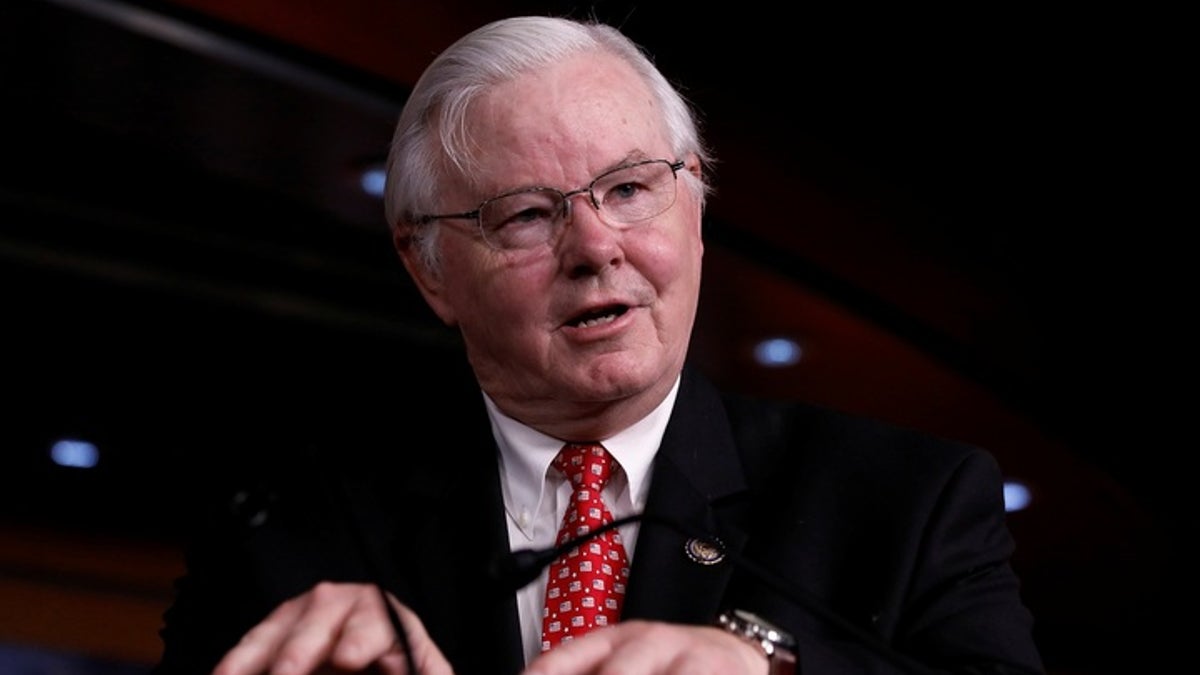
Rep. Joe Barton of Texas said he would not seek re-election. (Reuters/Aaron P. Bernstein)
Embattled Rep. Joe Barton, R-Texas, announced on Nov. 30, 2017, that he was retiring from Congress.
Barton’s announcement came after pressure for him to end his re-election bid mounted. Barton, 69, apologized after a nude photo of him surfaced on social media. He said he engaged in consensual sexual relationships while he was estranged from his second wife.
"I’ve always listened to people in Texas and worked for them in Washington, and I’ve been listening to a lot of people the last week in Texas," Barton told the Dallas Morning News in November. "There are enough people who lost faith in me that it’s time to step aside and let there be a new voice ... so I am not going to run for re-election."
Jim Bridenstine

Jim Bridenstine left Congress to become the NASA administrator. (NASA)
Rep. Jim Bridenstine, R-Okla., promised his third term would be his last when he ran for re-election in 2015.
And in April 2018, before that third term was completed, Bridenstine was confirmed by the Senate to become the newest NASA administrator, meaning the 43-year-old resigned his congressional seat.
Jason Chaffetz

Jason Chaffetz was a congressman from Utah. (Reuters/Jonathan Ernst)
Jason Chaffetz of Utah resigned from Congress in June 2017.
“My life has undergone some big changes over the last 18 months. Those changes have been good. But as I celebrated my 50th birthday in March, the reality of spending more than 1,500 nights away from my family over eight years hit me harder than it had before,” Chaffetz said at the time.
He later signed with Fox News as a contributor. John Curtis, a Republican, won a special election in November to replace him.
Thad Cochran

Sen. Thad Cochran, R-Miss., announced on March 5 that he will resign effective April 1 because of health concerns. (Reuters/Alexandre Meneghini)
Sen. Thad Cochran, R-Miss., chairman of the Senate Appropriations Committee, announced on March 5 that he will resign effective April 1, citing health issues.
"I regret my health has become an ongoing challenge," Cochran said in an online statement. "I intend to fulfill my responsibilities and commitments to the people of Mississippi and the Senate through the completion of the 2018 appropriations cycle."
The 80-year-old stayed home for a month last fall with urinary tract infections but returned to Washington in October, giving Republicans the majority they needed to pass a budget plan.
Cochran has been serving in the Senate since 1978. He's the 10th longest-serving senator in U.S. history.
Bob Corker
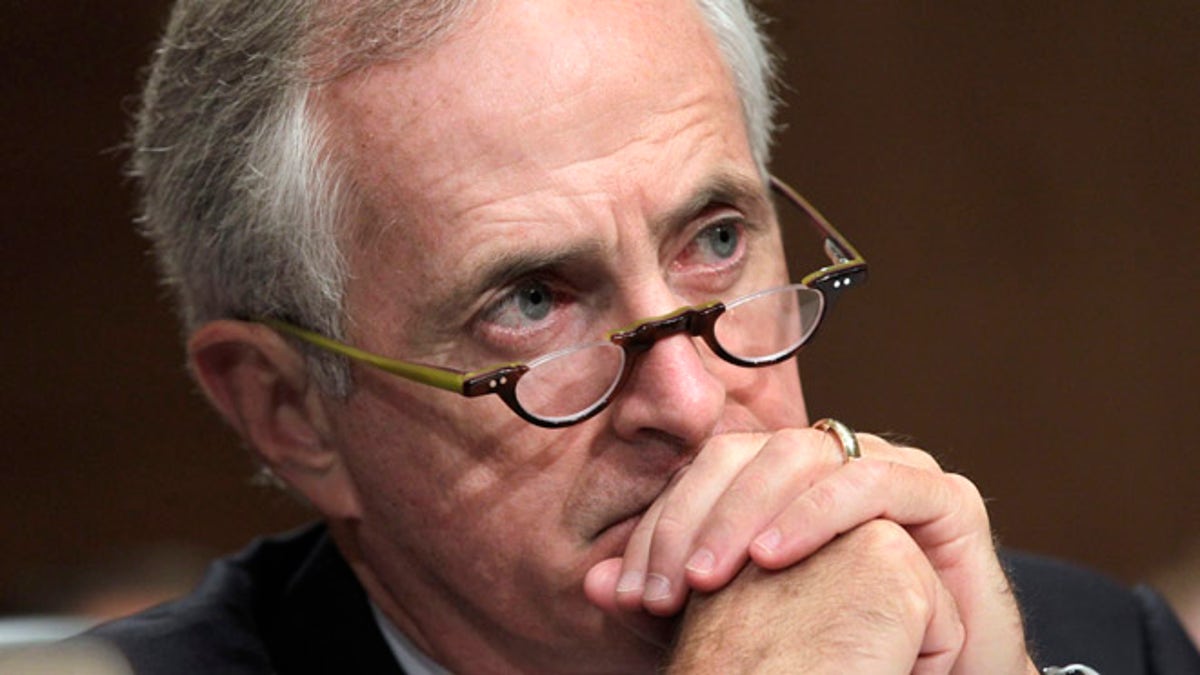
Sen. Bob Corker, R-Tenn., said he wouldn't run for a third term. His feud with President Trump has only escalated. (AP)
Sen. Bob Corker, R-Tenn., announced on Sept. 27, 2017, that he would not seek a third term in 2018.
Corker, 66, had previously said that he “couldn’t imagine” serving more than two terms. Corker has often feuded with President Trump.
Ryan Costello

Rep. Ryan Costello, R-Pa., said he does not plan to seek re-election. (Reuters/Aaron P. Bernstein)
Pennsylvania Republican Rep. Ryan Costello said in February 2018 that he would not seek re-election. Costello, 42, served in Congress since 2015.
Costello told The Daily Local his decision not to run again was both political and personal.
"Whether it's [Trump's rumored affair with porn star] Stormy Daniels, or passing an omnibus spending bill that the president threatens to veto after promising to sign, it's very difficult to move forward in a constructive way," Costello said. "Plus, I think there's a lot of hate out there, from the left especially, and it's a very angry environment."
Charlie Dent
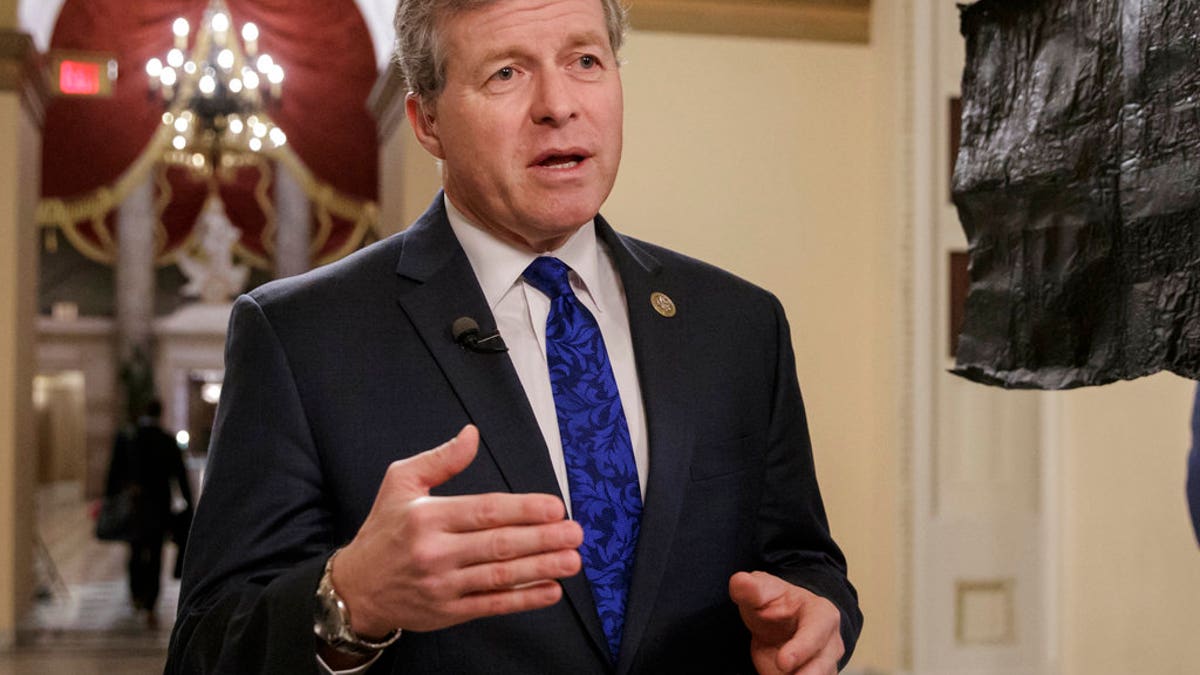
Rep. Charlie Dent of Pennsylvania has been openly critical of President Trump. (AP Photo/J. Scott Applewhite)
Pennsylvania Rep. Charlie Dent first said on Sept. 7, 2017, that he would not seek re-election. But the seven-term congressman later decided that he would not finish out his term, instead electing to leave Congress in May.
"After discussions with my family and careful reflection, I have decided to leave Congress in the coming weeks," Dent, 58, said in an April 17 statement. "It is my intention to continue to aggressively advocate for responsible governance and pragmatic solutions in the coming years."
Dent has been openly critical of Trump. He voted against party lines and a repeal of ObamaCare last year and warned the president against firing the special counsel in the Russia investigation.
Jimmy Duncan
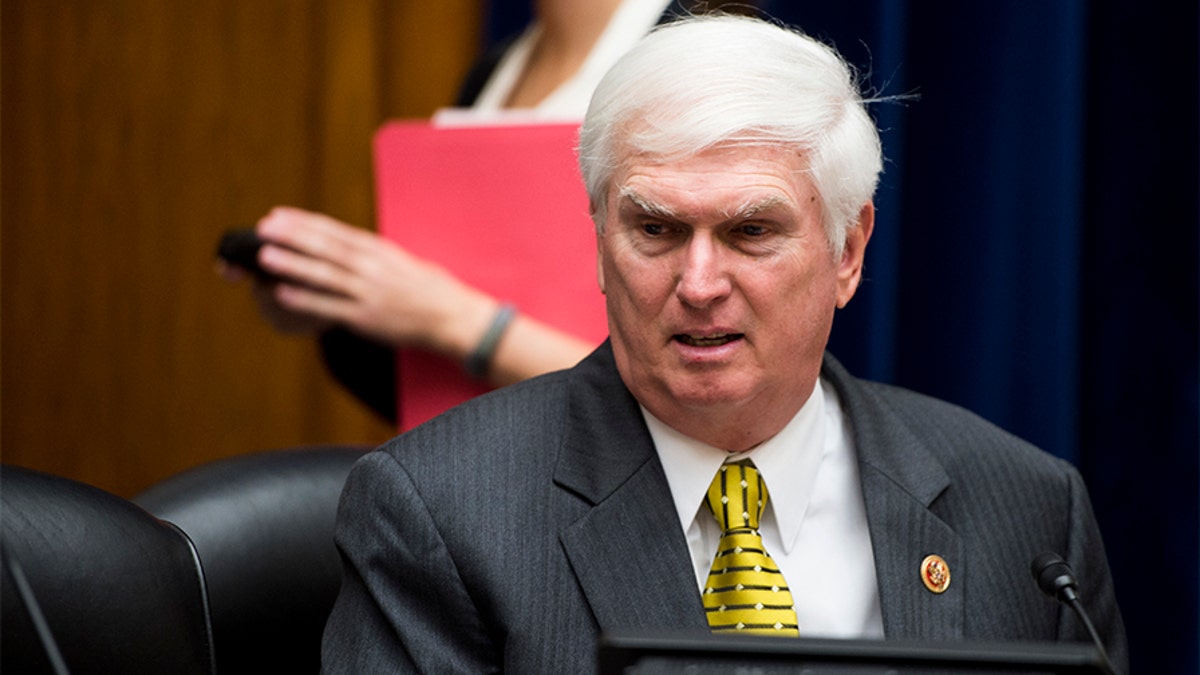
Rep. Jimmy Duncan Jr., R-Tenn., said he loves his family more than his job. (AP Photo)
Rep. Jimmy Duncan Jr., R-Tenn., announced in July 2017 that he would not seek re-election.
In announcing his retirement, Duncan, 71, thanked conservatives who supported him against “recent attacks against me from the far left.”
“I have decided I wanted to spend less time in airports, airplanes and traveling around the district and more time with my family, especially my nine grandchildren, who all live in Knoxville,” Duncan said. “I love my job, but I love my family more.”
Blake Farenthold
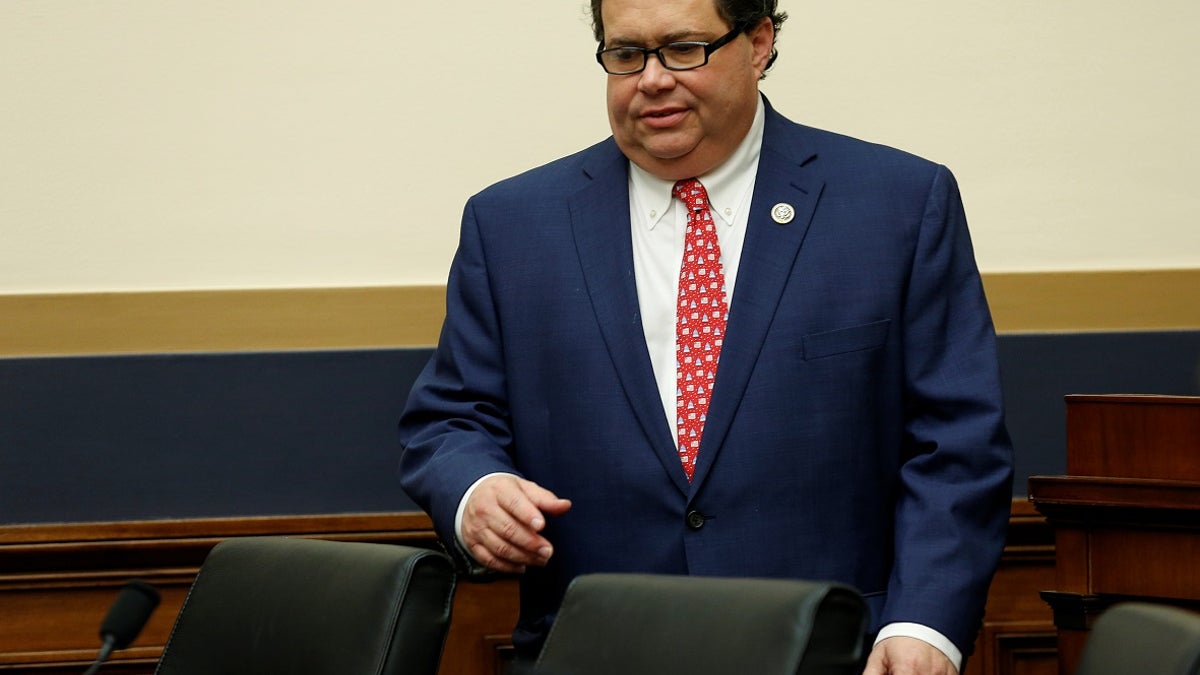
Rep. Blake Farenthold, R-Texas, said he would not seek re-election. The House Ethics Committee had opened an investigation into sexual harassment claims against him. (Reuters/Joshua Roberts)
Rep. Blake Farenthold, R-Texas, resigned from Congress on April 6, 2018.
"While I planned on serving out the remainder of my term in Congress, I know in my heart it’s time for me to move along and look for new ways to serve," he said in a statement.
The news came after Farenthold, 56, said in December that he was not going to run for re-election after multiple accusations of sexual harassment, misconduct and inappropriate behavior surfaced.
The House Ethics Committee had said it was expanding a probe into sexual harassment allegations against the lawmaker, which would include an investigation into whether he retaliated against a former staff member for complaining of such behavior. Congressional sources said Farenthold paid an $84,000 settlement using taxpayer money.
Jeff Flake

In announcing that he would not run for re-election, Sen. Jeff Flake, R-Ariz., slammed Republicans and President Trump. (Reuters/Joshua Roberts)
Sen. Jeff Flake, R-Ariz., announced on Oct. 24, 2017, that he would not seek re-election. Flake is an ardent critic of Trump.
In announcing that he wouldn’t run for re-election, Flake, 55, said the GOP is becoming a “backward-looking minority party.”
“It is clear in this moment that a traditional conservative, who believes in limited government and free markets, who is devoted to free-trade, who is pro-immigration, has a narrower and narrower path to nomination in the Republican Party, the party that has for so long defined itself by its belief in those things,” Flake said.
Trent Franks
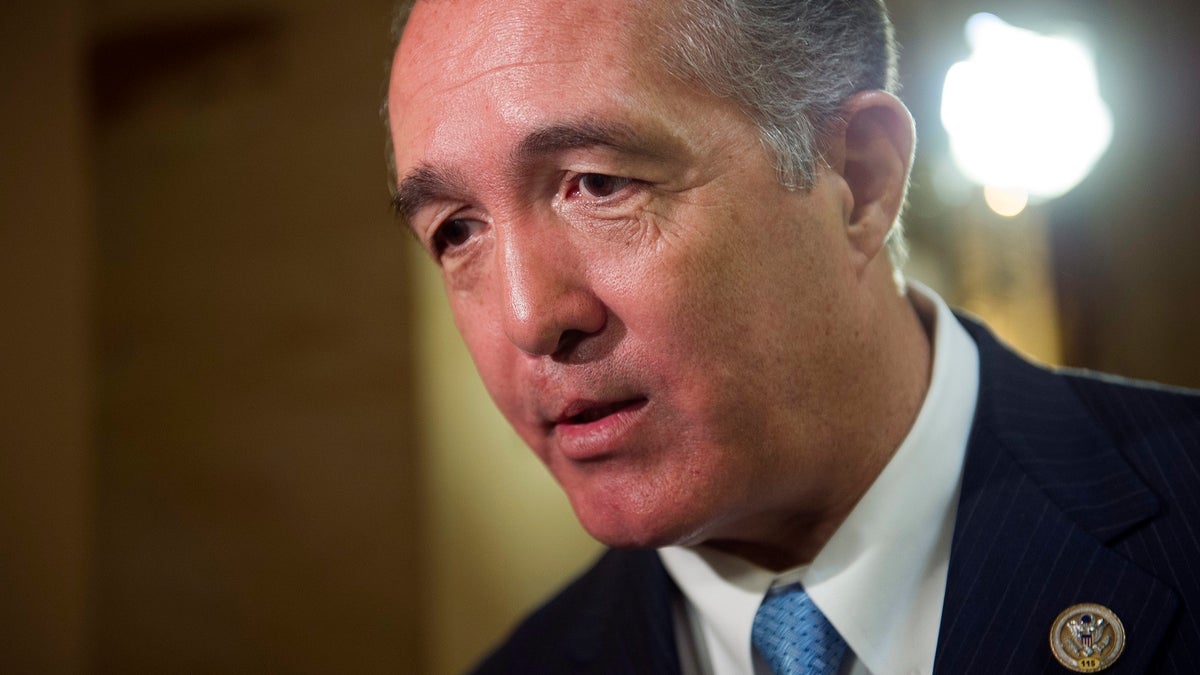
Rep. Trent Franks, R-Ariz., resigned after he said he made some female staffers "uncomfortable" by talking about surrogacy issues. (AP Photo)
Arizona Rep. Trent Franks announced on Dec. 8, 2017, his immediate resignation after sexual misconduct allegations surfaced against him.
He attributed the early resignation to his wife's admittance to the hospital but reports later surfaced alleging Frank repeatedly pressed a former aide to carry his child, offering her $5 million to act as a surrogate.
Franks’ announcement came as the House Ethics Committee said it was looking into whether he “engaged in conduct that constitutes sexual harassment and/or retaliation for opposing sexual harassment.”
Franks, 61, maintained that he never physically intimidated, coerced or had sexual contact with any member of his staff. He said he discussed surrogacy issues with some of his female staff which made them “uncomfortable.”
The conservative congressman said that “in the midst of this current cultural and media climate, I am deeply convinced I would be unable to complete a fair House Ethics investigation before distorted and sensationalized versions of this story would put me, my family, my staff and noble colleagues in the House of Representatives through hyperbolized public excoriation.”
Rodney Frelinghuysen
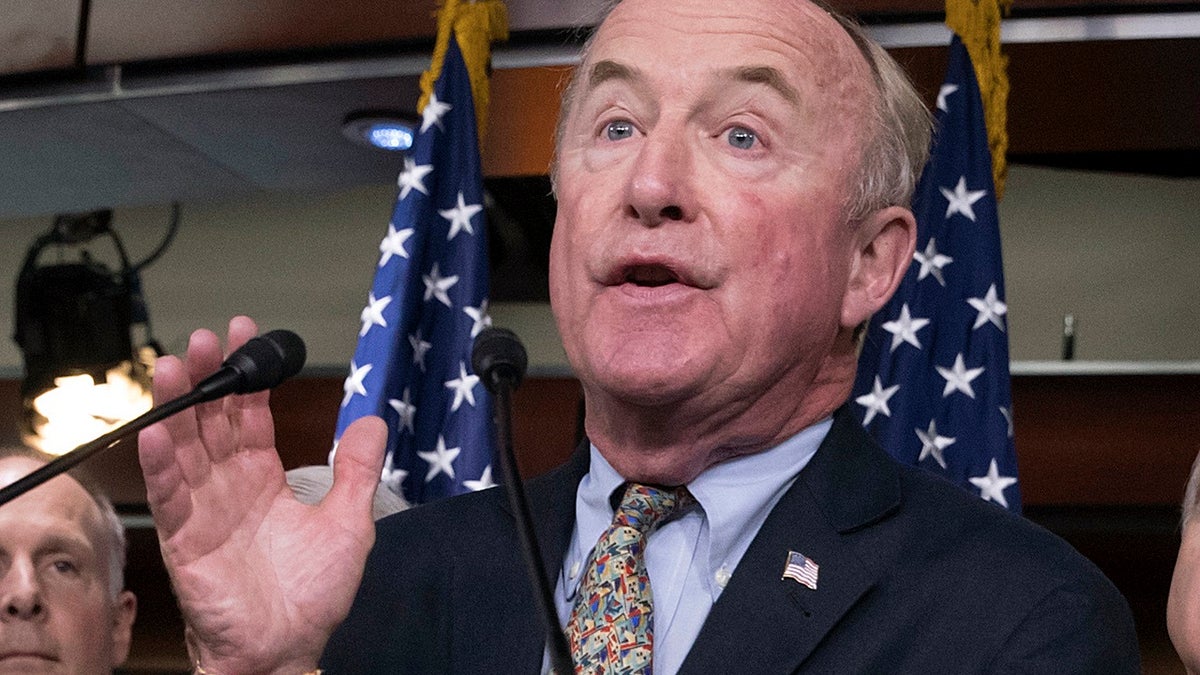
Rep. Rodney Frelinghuysen was facing his first competitive re-election race in decades. (AP Photo/J. Scott Applewhite)
Rep. Rodney Frelinghuysen is retiring at the end of his term.
The New Jersey Republican, who chairs the House Appropriations Committee, was facing his first competitive re-election race in decades.
Frelinghuysen, 72, was first elected in the 1994 GOP wave that put Republicans in control of both chambers. He hails from a New Jersey political dynasty that dates to the late 1700s. His father, Peter, served in the House for two decades.
Tom Garrett
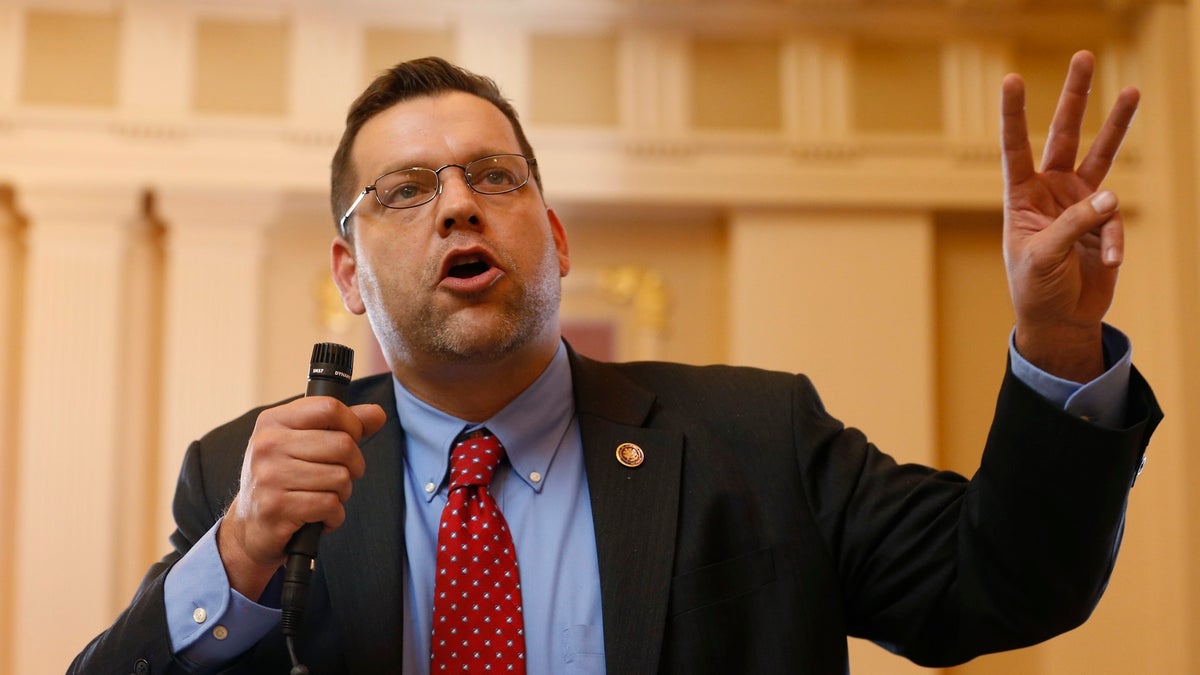
Rep. Tom Garrett, R-Va., said he'll no longer seek re-election, saying he needs to work on recovering from alcoholism and renewing his commitment to his family. (AP Photo/Steve Helber)
Rep. Tom Garrett, R-Va., announced on May 28 that he would not seek re-election as he battles with alcoholism.
"Any person -- Republican or Democrat or independent -- who has known me for any period of time and has any integrity knows two things: I am a good man, and I'm an alcoholic," Garrett, 46, said in a Memorial Day video message.
The announcement comes after reports of turmoil in Garrett's office. His chief of staff abruptly quit in May 2018, and staffers told Politico they were made into the congressman's "personal servants" -- running errands, picking up after his dog and being his wife's chauffeur.
Garrett has been in Congress since 2017.
Bob Goodlatte
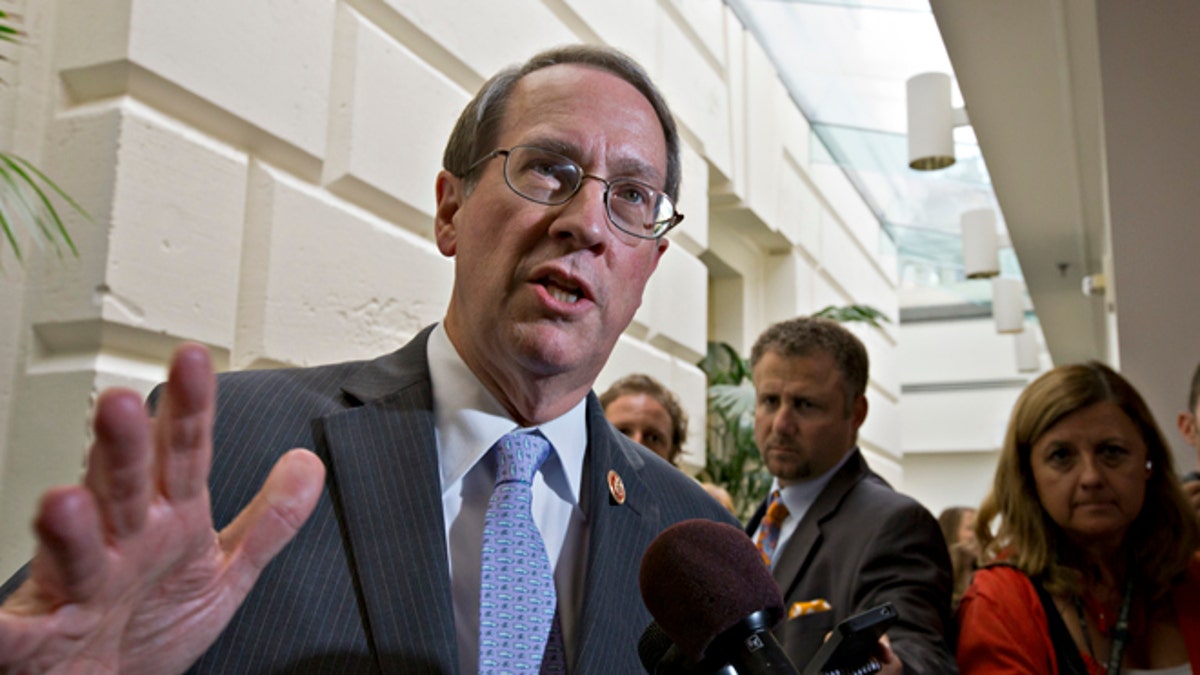
Rep. Bob Goodlatte is chairman of the House Judiciary Committee. (AP Photo)
House Judiciary Committee Chairman Bob Goodlatte announced on Nov. 9, 2017, that he would not seek re-election, saying it is “the right time to step aside.”
The Virginia lawmaker, who has been in Congress since 1993, said he has discussed whether to run for re-election with his wife, Maryellen, every two years. This year’s conversation, Goodlatte said, was different.
“With my time as Chairman of the Judiciary Committee ending in December 2018, this is a natural stepping-off point and an opportunity to begin a new chapter of my career and spend more time with my family, particularly my granddaughters,” Goodlatte, 66, said in a letter.
Trey Gowdy

Trey Gowdy is the chairman of the House Oversight Committee. (Reuters/Kevin Lamarque)
House Oversight Committee Chairman Trey Gowdy announced on Jan. 31, 2018 that he would not seek re-election or any other political office.
The South Carolina Republican, who until recently also sat on the House Ethics Committee, said he would be “returning to the justice system.”
“Whatever skills I may have are better utilized in a courtroom than in Congress, and I enjoy our justice system more than our political system,” the 54-year-old said. “As I look back on my career, it is the jobs that both seek and reward fairness that are most rewarding.”
Gowdy also oversaw the divisive House investigation into the 2012 Benghazi attack.
Gregg Harper

Rep. Gregg Harper, R-Miss., fought for mandatory anti-harassment and anti-discrimination training for Congress. (AP Photo/Rogelio V. Solis)
Rep. Gregg Harper, R-Miss., announced in January 2018 that he would not seek re-election at the end of his term. The House Administration Committee chairman said he tried to make Congress more transparent and accountable during his tenure.
Harper, 62, was first elected in 2008. He said “10 years will be long enough” for him to have served in Congress.
Harper was an ardent supporter of anti-harassment and anti-discrimination training in the U.S. House. His committee held a hearing in November 2017 regarding sexual misconduct involving current House members.
After the hearing, House Speaker Paul Ryan announced that the House would begin to require anti-harassment and anti-discrimination trainings for members and their staff.
Orrin Hatch
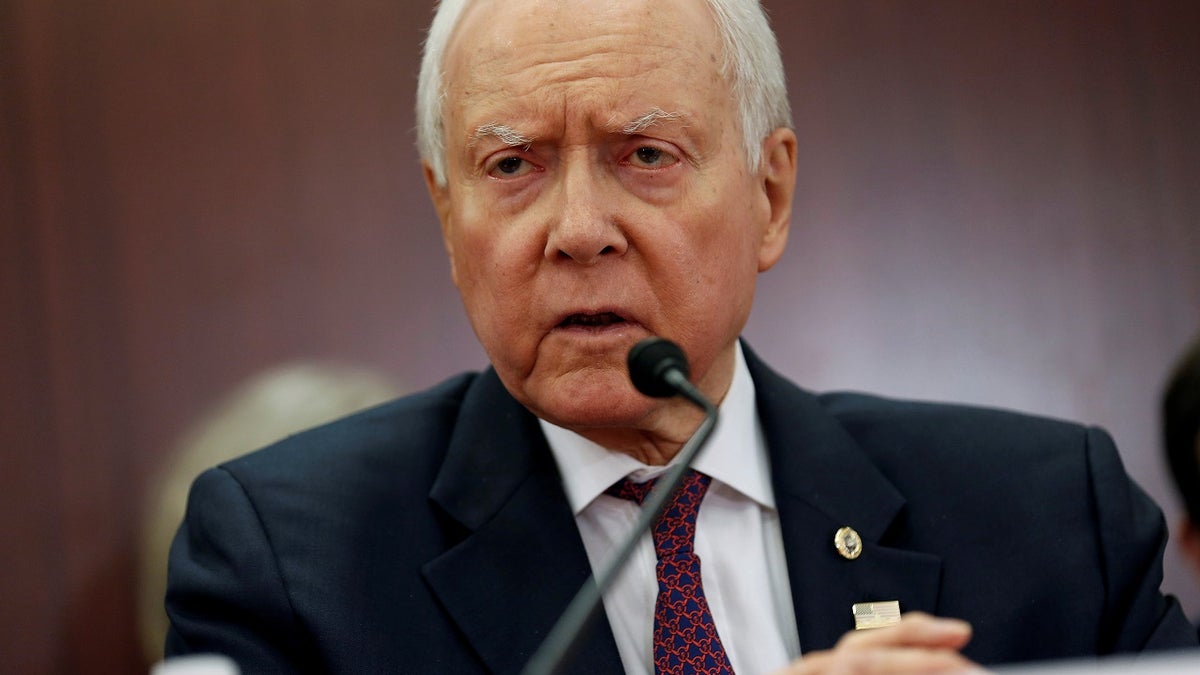
Sen. Orrin Hatch's announcement that he would not seek re-election is largely seen as paving the way for Mitt Romney, a former Republican presidential nominee, to run for the seat. (Reuters/Joshua Roberts)
Sen. Orrin Hatch, R-Utah, is the longest-serving Senate Republican. He announced on Jan. 2, 2018 – after weeks of speculation – that he would not seek re-election at the end of his term.
The 84-year-old said Trump told him during a recent visit to Utah that he was a “fighter.”
“But every good fighter knows when to hang up the gloves. And for me, that time is soon approaching,” Hatch said in a video message posted on social media.
“I’ve authored more bills that have become law than any member of Congress alive today,” Hatch also said, adding that one of his “proudest legislative achievements” was his work with the Religious Freedom Restoration Act, which ensures religious freedoms are protected.
Jeb Hensarling
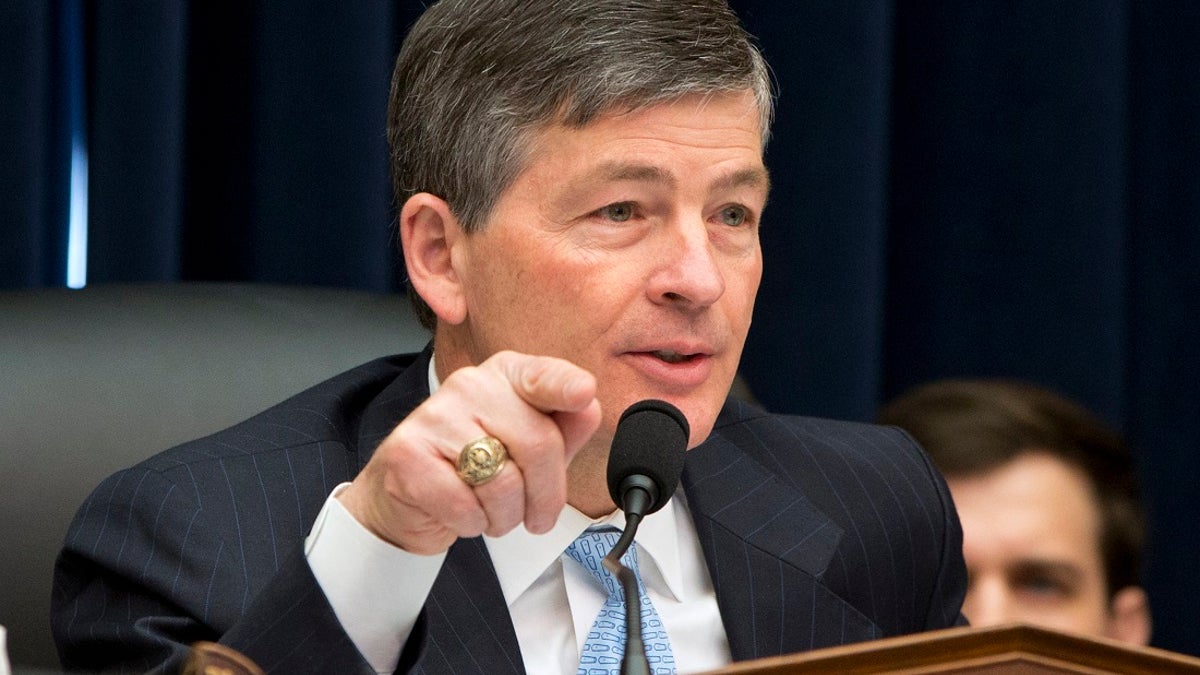
Rep. Jeb Hensarling, R-Texas, said he wants to spend more time with his family. (AP Photo/Jacquelyn Martin)
Rep. Jeb Hensarling, R-Texas, announced on Oct. 31, 2017, that he would not run for re-election in 2018.
"Although service in Congress remains the greatest privilege of my life, I never intended to make it a lifetime commitment, and I have already stayed far longer than I had originally planned," Hensarling, 61, said, according to the Dallas Morning News.
Hensarling also said he wanted to spend more time with his family.
Darrell Issa

Rep. Darrell Issa's California congressional seat is seen as a toss-up that could go to a Democrat in 2018. (Reuters/Mike Blake)
Rep. Darrell Issa, R-Calif., will retire at the end of his term, he announced on Jan. 10, 2018.
Issa, 65, only barely won re-election in 2016. He beat his Democratic challenger, Douglas Applegate, by less than one percentage point for California’s 49th congressional district.
This seat was seen as a toss-up that could potentially go to a Democrat in 2018, even prior to Issa’s impending retirement.
“Representing you has been the privilege of a lifetime,” Issa, who has been in Congress since 2001, said in a statement.
Lynn Jenkins

Thought to be a candidate for governor in Kansas, Rep. Lynn Jenkins instead said she'll be returning to the private sector. (Reuters/Mark Kauzlarich)
Rep. Lynn Jenkins, R-Kan., announced on Jan. 25, 2017, that she would not seek re-election or run for another office.
Jenkins, 55, said she wanted to return to the private sector although she was highly rumored to be a possible gubernatorial candidate in Kansas.
Sam Johnson
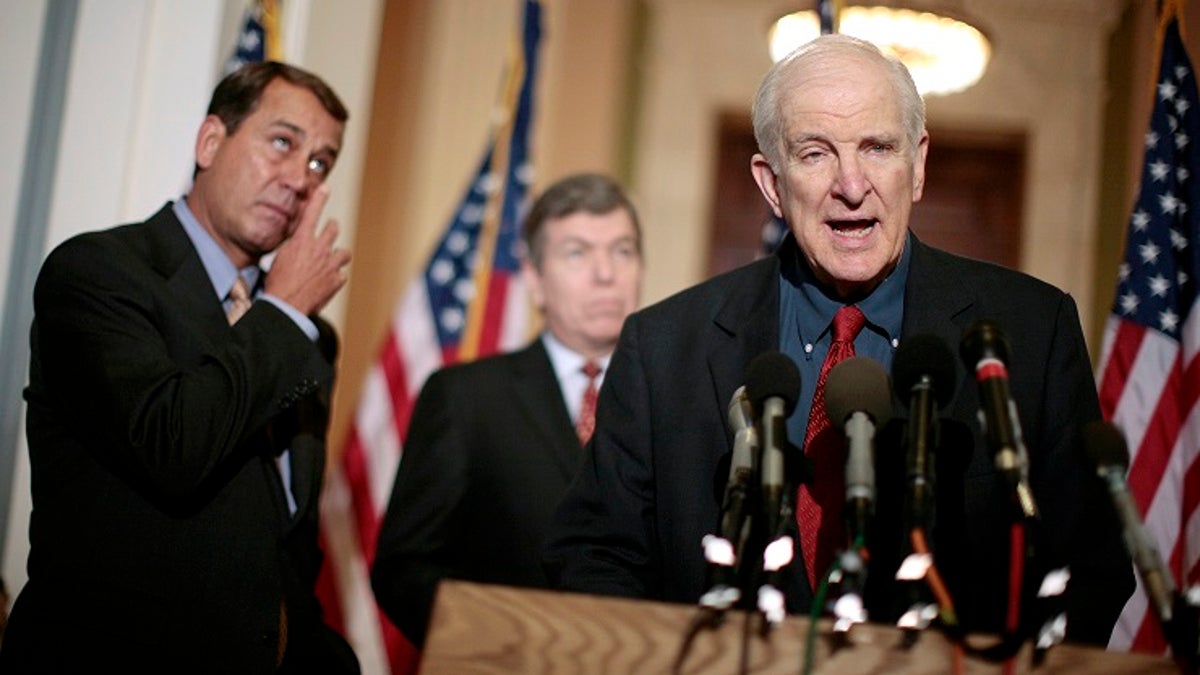
Longtime Rep. Sam Johnson, 86, is an Air Force veteran who served in Vietnam. (Reuters/Jason Reed)
Longtime Texas Rep. Sam Johnson announced his retirement on Jan. 6, 2017.
“For me, the Lord has made clear that the season of my life in Congress is coming to an end,” Johnson, 88, said.
Johnson is an Air Force veteran who was a prisoner of war at the infamous Hanoi Hilton in Vietnam.
Frank LoBiondo
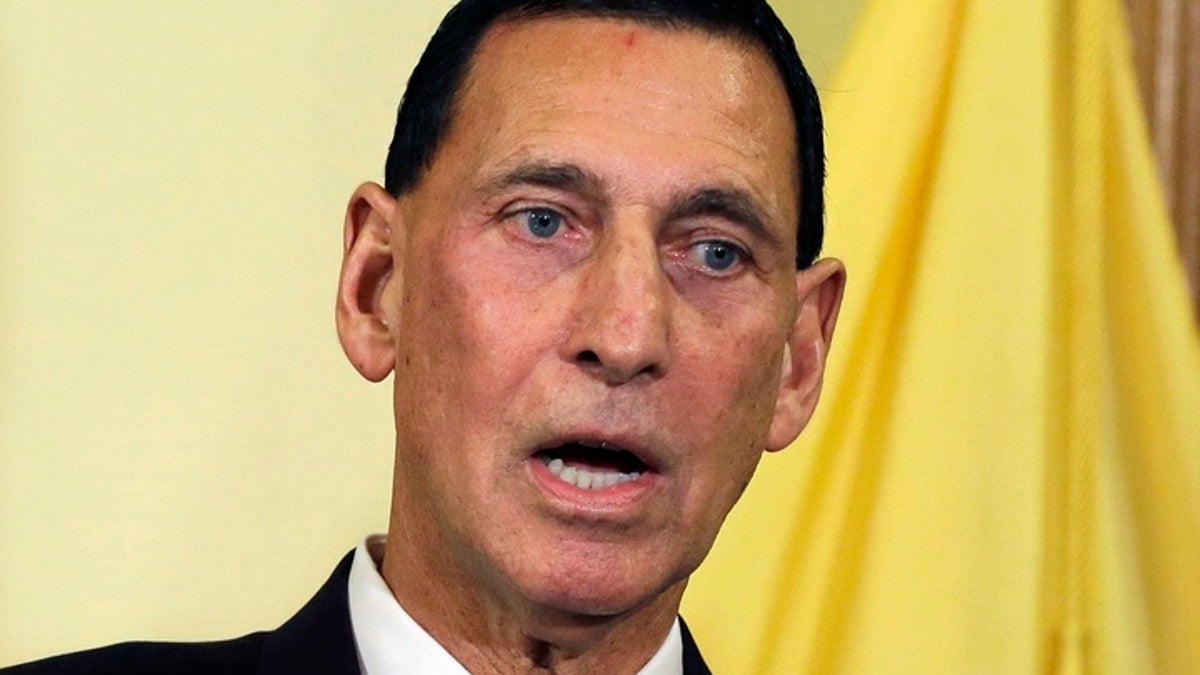
Rep. Frank LoBiondo of New Jersey has differed from his party on a variety of issues. (AP Photo/Mel Evans)
Rep. Frank LoBiondo, R-N.J., will retire from Congress at the end of his term. The 72-year-old assumed his seat in 1995.
LoBiondo’s retirement opens up a seat in a potential swing district. Trump won it in 2016, but former President Barack Obama took the district in 2012.
The GOP lawmaker has differed from his party on certain issues. He voted against the budget framework and has expressed concerns about Republicans’ tax plan, specifically the move to eliminate certain state and local deductions.
John McCain

Longtime Sen. John McCain died in office in August at the age of 81. (AP Photo)
Longtime venerable Sen. John McCain died in office on Aug. 25, 2018, at the age of 81. He had suffered from glioblastoma, an aggressive brain tumor.
McCain was a war hero who survived five years as a prisoner of war in Vietnam, served three decades in Congress and went on to become the Republican Party’s nominee for president in 2008.
"I am so lucky to have lived the adventure of loving this incredible man for 38 years," his wife Cindy McCain said. "He passed the way he lived, on his own terms, surrounded by the people he loved, in the place he loved best."
Patrick Meehan
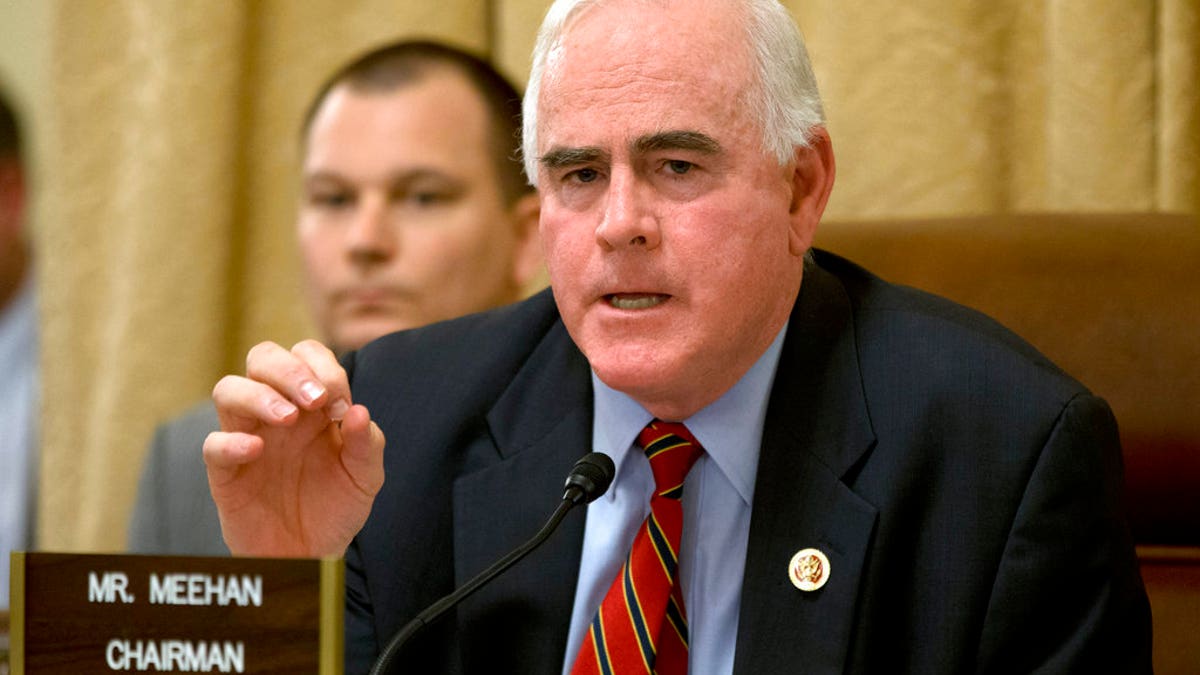
Rep. Patrick Meehan, R-Pa., said he would not seek re-election after he allegedly used taxpayer money to fund a settlement to a former aide who claimed he sexually harassed her. (Reuters/Jim Bourg)
Rep. Patrick Meehan, R-Pa., initially said he would not seek re-election in January 2018, but in April, he announced he would resign his seat effective immediately.
"With the knowledge I would not be standing for another term, I have decided that stepping down now is in the interest of the constituents I have been honored to serve," he said in a statement. "I have stayed to fight for important priorities like fully funding our troops, increasing support for medical research and preserving promising clean energy solutions. And now that work is accomplished."
The decision not to seek re-election, the 63-year-old said, was made following reports that he allegedly used taxpayer money to fund a settlement to a former aide who claimed he sexually harassed her. Meehan called the revelations "a major distraction" and said he needed "to own it because it is my own conduct that fueled the matter."
Meehan has acknowledged telling a longtime former aide that he considered her a "soul mate" and admitted acting "selfishly" after learning that she was dating someone else. The former aide filed a sexual misconduct complaint against the lawmaker last summer, and he allegedly used taxpayer money in the settlement.
In his resignation, Meehan promised to repay the $39,000 back to the U.S. Treasury and said he did not want to put his staff through an Ethics Committee probe, even though he believed he would have been cleared of wrongdoing.
"Though I wish my time in Congress would have finished in a more satisfying manner, I am proud of our accomplishments and thank the residents of my District for their confidence in me over the last eight years," he said. "I recognize that there are constituents who are disappointed in the manner in which I handled the situation that lead to my decision not to seek re-election and wish I had done better by them."
Tim Murphy
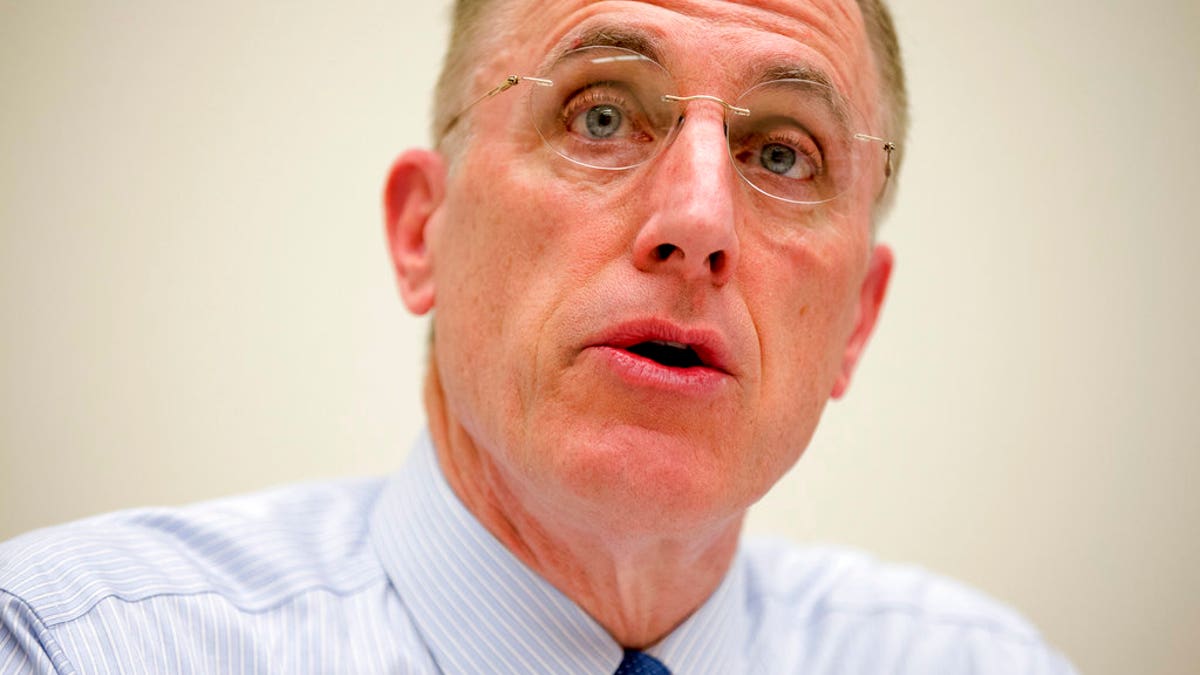
Rep. Tim Murphy, R-Pa., resigned from his position in October 2017 following reports that he attempted to pressure his mistress into having an abortion. (AP Photo/Andrew Harnik)
GOP Rep. Tim Murphy of Pennsylvania announced on Oct. 5, 2017, that he would resign his position in Congress. The news followed reports that the lawmaker, who has publicly been staunchly anti-abortion, had an affair and asked his mistress to get an abortion when they believed she was pregnant.
Murphy, 66, said he will “take personal time to seek help as my family and I continue to work through our personal difficulties.”
Robert Pittenger

Rep. Robert Pittenger, R-N.C., was the first incumbent to lose in the 2018 primary cycle. (Reuters/Chris Keane)
In May 2018, Rep. Robert Pittenger, R-N.C., lost the Republican primary for re-election. A three-term incumbent, Pittenger narrowly lost to Rev. Mark Harris, a Southern Baptist preacher.
Pittenger, 70, was the first incumbent to lose in the 2018 primary cycle.
Ted Poe

Rep. Ted Poe, R-Texas, announced that he would not seek re-election and would instead spend more time with his grandchildren. (AP Photo/Carolyn Kaster)
In a Twitter message, Rep. Ted Poe, R-Texas, announced that he will not seek re-election.
“I am grateful for the honor and privilege to represent the best people in America, Texas’s Second Congressional District. Thanks to the good Lord, I’m in good health, but it’s time for the next step,” Poe, 70, said on Nov. 7, 2017.
He added that he’s planning to spend more time with his grandchildren. All 12 of them were born since he’s been in Congress, Poe said. He assumed office in 2005.
Dave Reichert
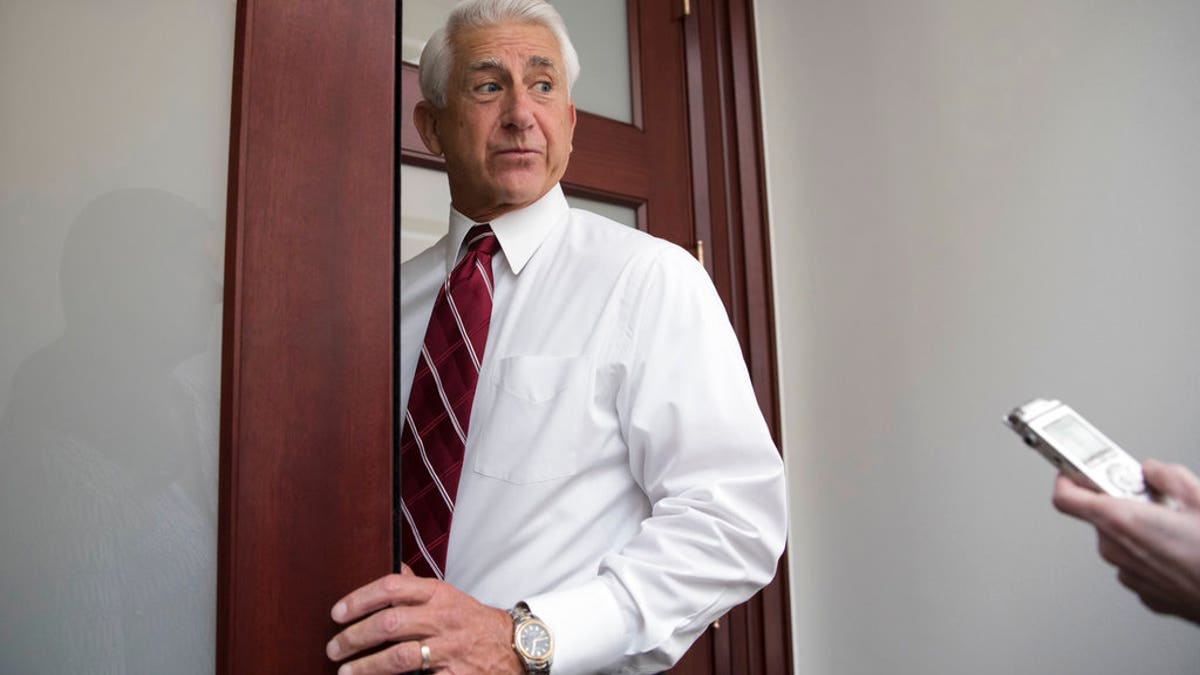
Rep. Dave Reichert, R-Wash., has served seven terms in Congress. (AP Photo/J. Scott Applewhite)
After serving seven terms in Congress, Rep. Dave Reichert, R-Wash., said he would not seek re-election on Sept. 6, 2017. A former sheriff, Reichert, 68, represents a district that is being targeted by Democrats in 2018. Democratic presidential candidate Hillary Clinton won the area in the 2016 election.
Reichert said the decision to retire from Congress was “the right one for my family and me.”
Tom Rooney

Rep. Tom Rooney, R-Fla., said he would not run for re-election after having served 10 years in Congress. (AP Photo/Jacquelyn Martin)
After nearly 10 years in Congress, Rep. Tom Rooney, R-Fla., said he will not be running for re-election.
Rooney, 47, said in a statement that “it’s time to ‘hang em up’" and thanked his constituents for "allowing [him] the opportunity to serve them in Washington."
“I look forward to serving Florida again in the future in a different capacity. Keep the faith. Slainte!” the congressman said.
According to the Tampa Bay Times, Rooney’s decision was not too surprising, given his frustration with Washington. The publication also said Rooney was “deeply affected” by the shooting at a practice for the Congressional Baseball Game in June 2017.
Ileana Ros-Lehtinen

Rep. Ileana Ros-Lehtinen, R-Fla., was not a strong supporter of President Trump. (Reuters/Joe Skipper)
Rep. Ileana Ros-Lehtinen, R-Fla., announced on April 30, 2017, that she would not seek re-election. Ros-Lehtinen, 66, has been a congresswoman since 1989.
“The most difficult challenge is not to simply keep winning elections; but rather the more difficult challenge is to not let the ability to win define my seasons,” she said.
Born in Havana, Cuba, Ros-Lehtinen is considered a moderate Republican who was not a strong supporter of Trump.
Dennis Ross

After serving in Congress since 2011, Rep. Dennis Ross of Florida announced on April 11, 2018 that he would not seek re-election. (Reuters/Jose Luis Magana)
Rep. Dennis Ross, R-Fla., announced on April 11, 2018, that he would not seek re-election. Ross, 59, has been in Congress since 2011.
“I am grateful for this incredible opportunity to serve and I look forward to the next chapter of my life which will include, in some way, continued public service,” Ross said in a Facebook statement. “I never viewed this amazing opportunity as a job or a career. My home has been and will continue to be in Lakeland, Florida.”
As a lawmaker, he served on multiple House Oversight and Government Reform subcommittees, including Federal Workforce, U.S. Postal Service and Labor Policy.
Ed Royce
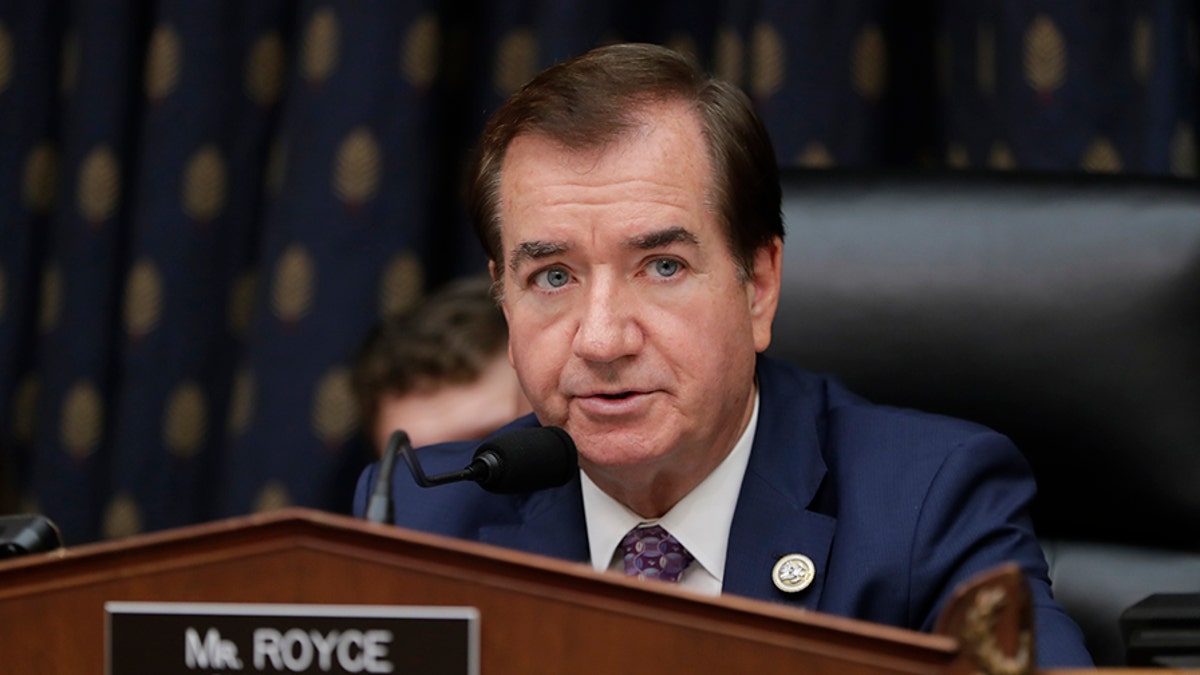
Rep. Ed Royce, R-Calif., is the chairman of the House Foreign Affairs Committee. (AP Photo/J. Scott Applewhite)
On Jan. 8, 2018, Rep. Ed Royce, R-Calif., announced that he would not seek re-election.
Royce, the chairman of the House Foreign Affairs Committee, said that he wanted to completely focus his final year as committee chairman on the "urgent threats facing our nation."
Royce, 67, is serving out his 13th term.
In an announcement detailing his decision to not seek re-election, Royce cited the tax cut bill passed in December and the crackdown on the global ivory trade as some of his accomplishments.
Paul Ryan

House Speaker Paul Ryan announced on April 11, 2018 that he will not seek re-election. (Reuters/Joshua Roberts)
House Speaker Paul Ryan, R-Wis., announced on April 11, 2018, that he would finish out his term in Congress but not seek re-election.
Ryan was first elected to Congress in 1998 and has served as House Speaker since October 2015.
In his announcement, Ryan, 48, said he wanted to spend more time with his wife and three children. The speaker was known for sleeping in his Capitol Hill office and traveling back to Wisconsin weekly.
“I have given this job everything I had, and I have no regrets whatsoever for having accepted this responsibility,” Ryan said. “This has been one of the two greatest honors of my life.”
Ryan said it’s “easy” for his job “to take over everything in your life.”
As speaker, Ryan was instrumental in the passage of the 2017 tax reform bill – an issue that is close to his heart. He said reforming the nation’s tax code and increasing defense spending were “lasting victories that make this country more prosperous and more secure for decades to come.”
Despite disagreements between the two, President Trump called Ryan a “truly good man” who will “leave a legacy of achievement that nobody can question” on social media.
Mark Sanford
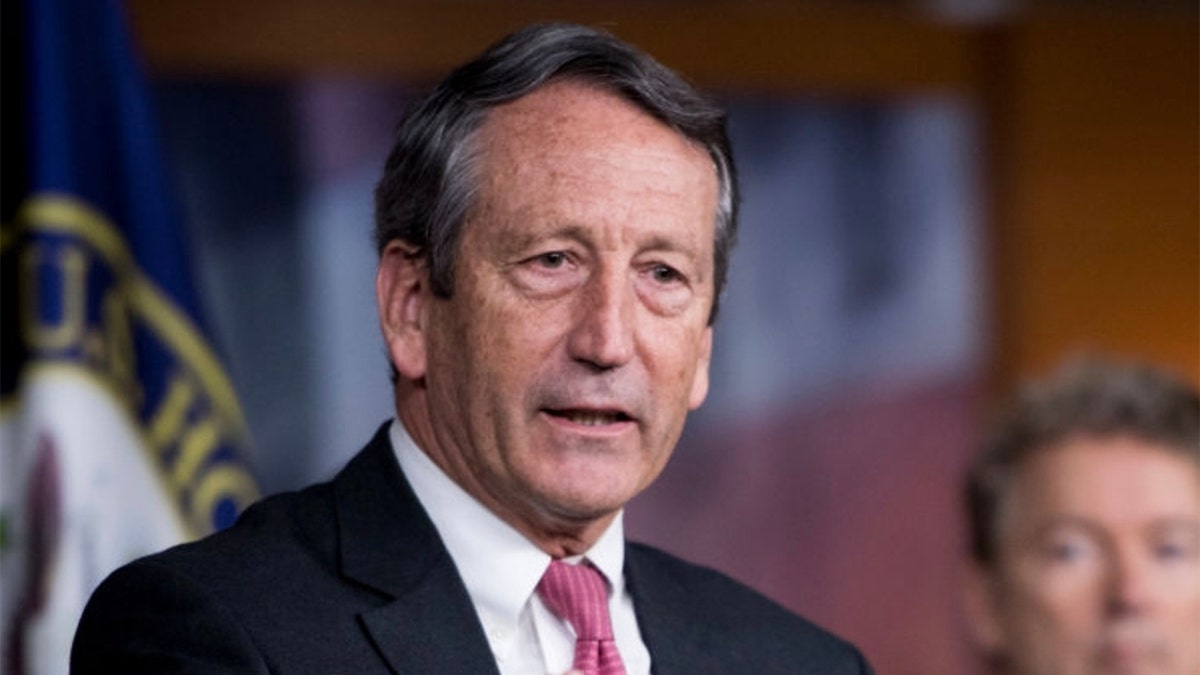
Rep. Mark Sanford lost the Republican primary for re-election in 2018. (Getty Images)
South Carolina Rep. Mark Sanford, the state's former governor, lost his primary election in June. A frequent critic of the president, Sanford was beaten by state Rep. Katie Arrington, a political newcomer who had Trump's backing.
Sanford, 58, has served in Congress since 2013.
The primary loss is largely seen as the possible conclusion of a stunning fall for Sanford, whose scandal-pocked career nearly ended in 2009 when he acknowledged having a secret extramarital affair with a woman in Argentina while serving as South Carolina's governor. The scandal earned him the nickname "Luv Gov."
Bill Shuster
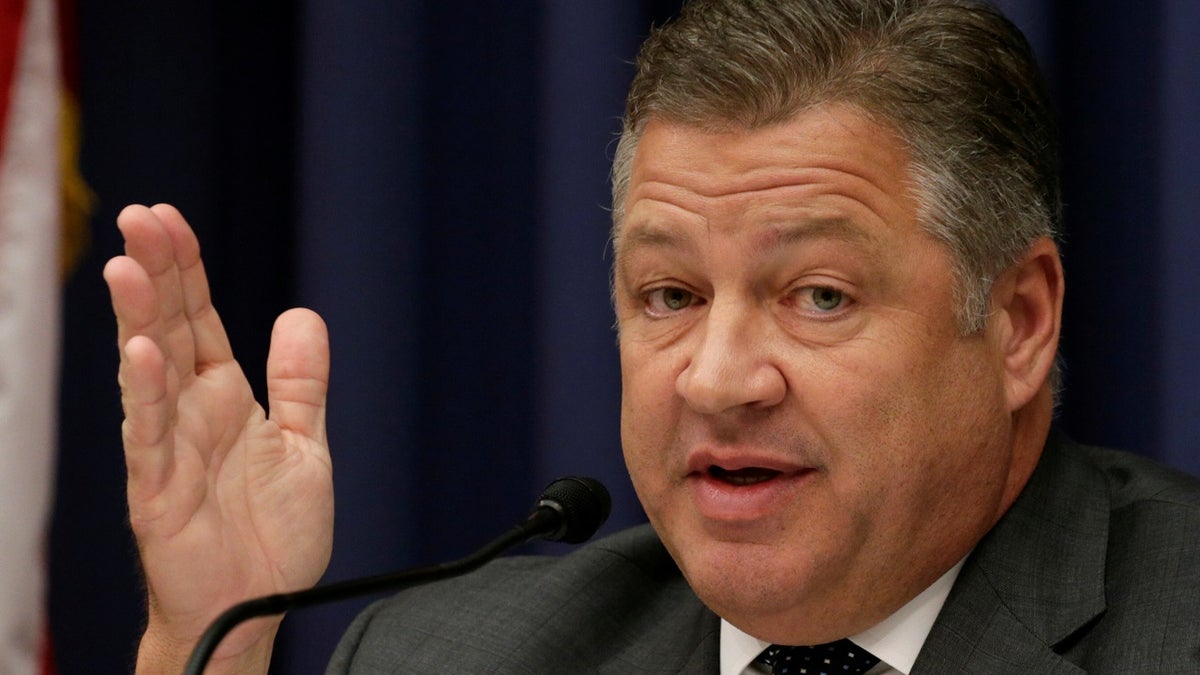
Rep. Bill Shuster, R-Pa., announced he would not seek re-election at the beginning of 2018. (Reuters/Kevin Lamarque)
Chairman of the House Transportation Committee, Rep. Bill Shuster, 57, told the Washington Examiner that even though he doesn’t plan to seek re-election, he still hopes to work with Trump on passing a large infrastructure bill before he leaves Congress.
The Pennsylvania Republican announced on Jan. 2, 2017 that he would not seek re-election in November. He told the publication that as he would not be coming back to Washington as a congressman, he could better work with parties on both sides of the aisle during his remaining time in office.
Lamar Smith

Rep. Lamar Smith, R-Texas, has served in Congress since 1987. (House of Representatives)
Rep. Lamar Smith, a 70-year-old Republican serving Texas, announced on Nov. 2, 2017, that he would be retiring from Congress at the end of his term.
Smith, who chairs the House Committee on Science, Space and Technology, has served in the House of Representatives since 1987.
Luther Strange
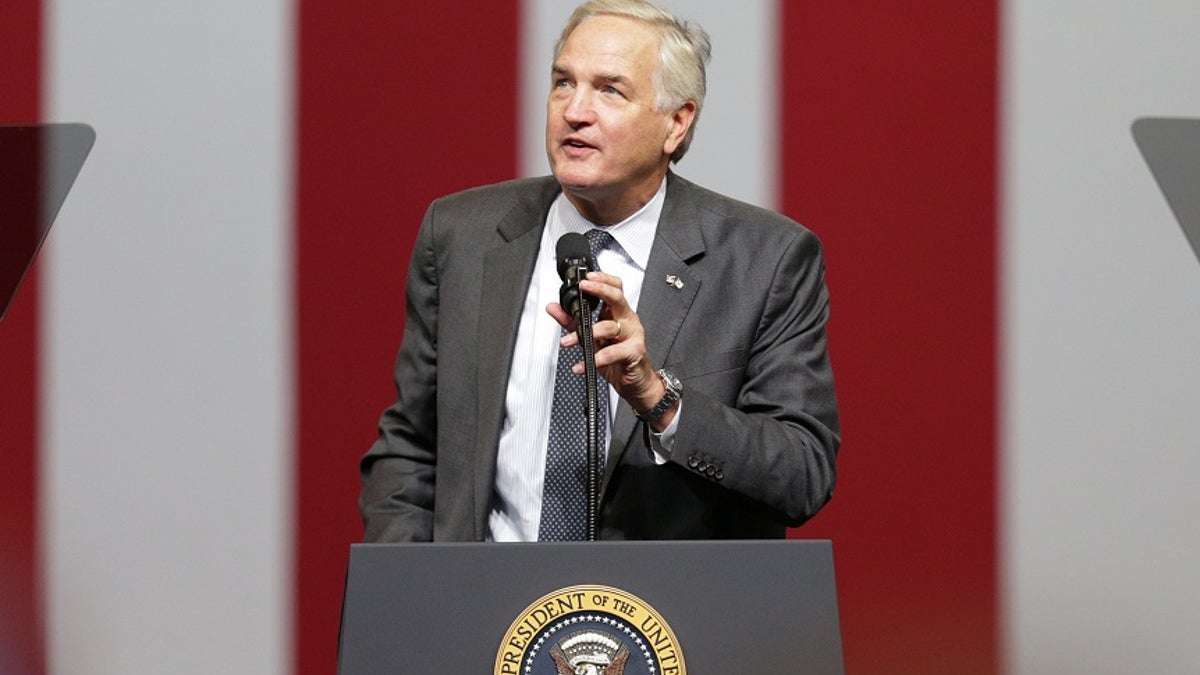
Sen. Luther Strange, R-Ala., lost the special primary election earlier this year to Roy Moore. (Reuters/Marvin Gentry)
Luther Strange, R-Ala., was appointed to Jeff Sessions’ old Senate after he was picked to be the attorney general.
But Strange, 65, lost in the special primary election earlier in 2017 to Roy Moore. Moore became the GOP nominee for the Senate and eventually lost to Democrat Doug Jones.
In his farewell speech in December, Strange encouraged his fellow lawmakers to remain committed to bipartisanship.
“To lose the art of balance and compromise in this body is to lose something essentially American,” he said.
Pat Tiberi
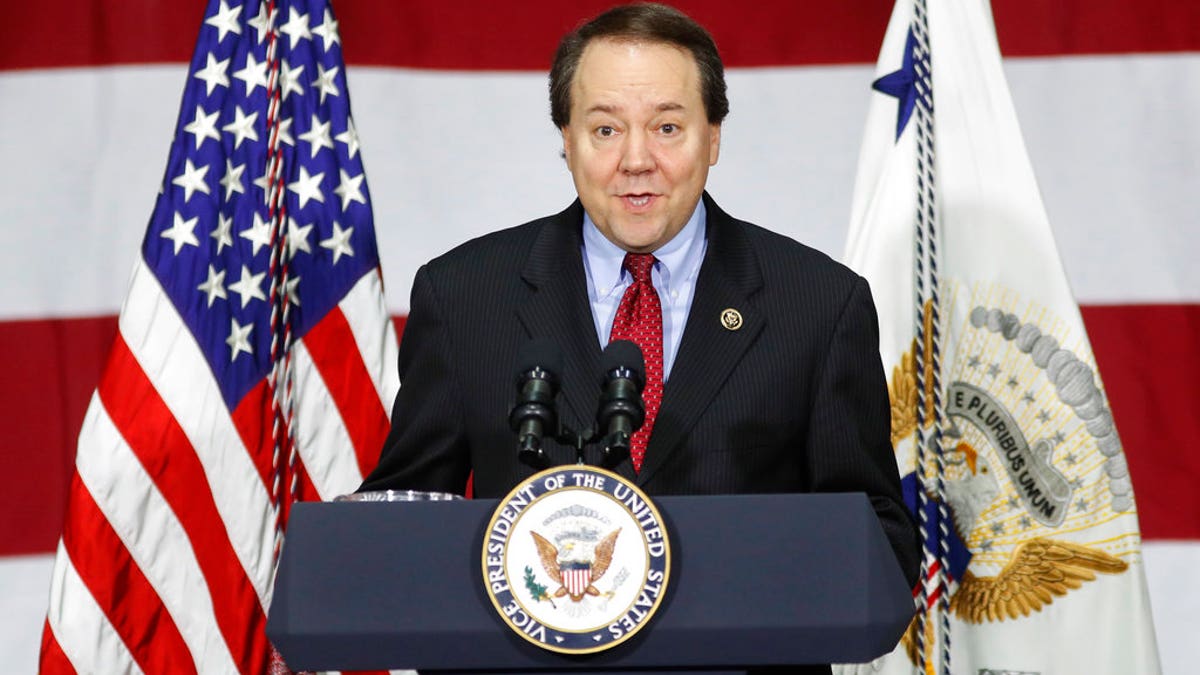
Rep. Pat Tiberi, R-Ohio, announced that he would be resigning from office in early 2018 to lead a business policy group. (AP Photo/John Minchillo)
Ohio Rep. Pat Tiberi, 56, announced on Oct. 19, 2017, that he would resign from Congress in early 2018 to lead the Ohio Business Roundtable as the association's president.
Serving as a Republican congressman for 17 years, Tiberi's final day in Congress was Jan. 15, 2018.
Dave Trott

Rep. Dave Trott, R-Mich., said he will not seek re-election, potentially paving the way for the Republican-leaning district to flip. (AP Photo/Carlos Osorio)
Rep. Dave Trott, R-Mich., announced on Sept. 11, 2017, that he would not seek re-election.
Trott, 58, will retire at the end of his second term. His district is Republican-leaning, but analysts told the Detroit News that a Democrat could flip the seat.
Republican lawmakers seeking another office
Lou Barletta

Rep. Lou Barletta ran for Senate in Pennsylvania. (Reuters/Mike Segar)
Rep. Lou Barletta was the Republican nominee for Senate in Pennsylvania. He lost to incumbent Sen. Bob Casey, a Democrat.
Barletta, 62, had the backing of Trump in the primary election.
Diane Black
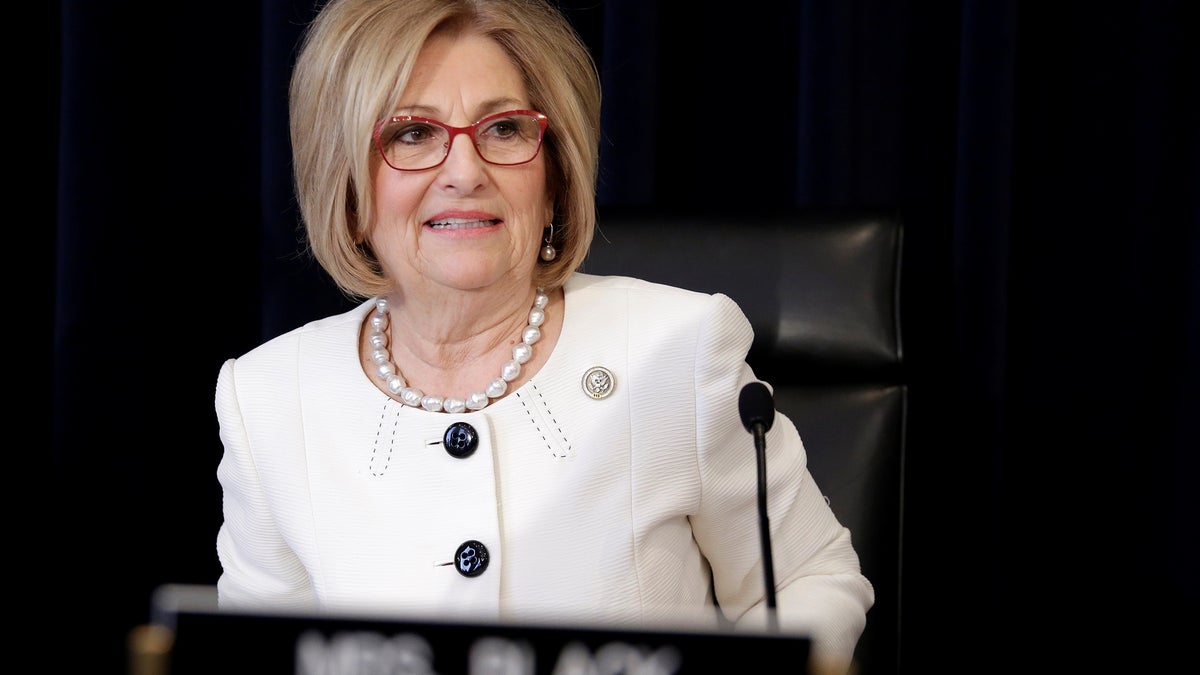
Rep. Diane Black, a Republican, ran for governor in Tennessee but lost the GOP primary. (Reuters/Joshua Roberts)
Having served in Congress for four terms, Rep. Diane Black, R-Tenn., announced in August 2017 that she would run for governor in her state. However, she lost the GOP nomination to Bill Lee, the governor-elect.
Black, 67, was the first female chair of the powerful House Budget Committee, and she was in that position during the nation’s tax overhaul. She resigned as chairwoman last year to focus on her gubernatorial race.
Ron DeSantis

Rep. Ron DeSantis is running for governor in Florida. (AP Photo)
Rep. Ron DeSantis, R-Fla., resigned from Congress in September amid his gubernatorial bid. After a contentious Florida recount, DeSantis' Democratic opponent conceded the race.
A former Navy lawyer, DeSantis, 40, is an ardent supporter of Trump, who has endorsed him.
Evan Jenkins
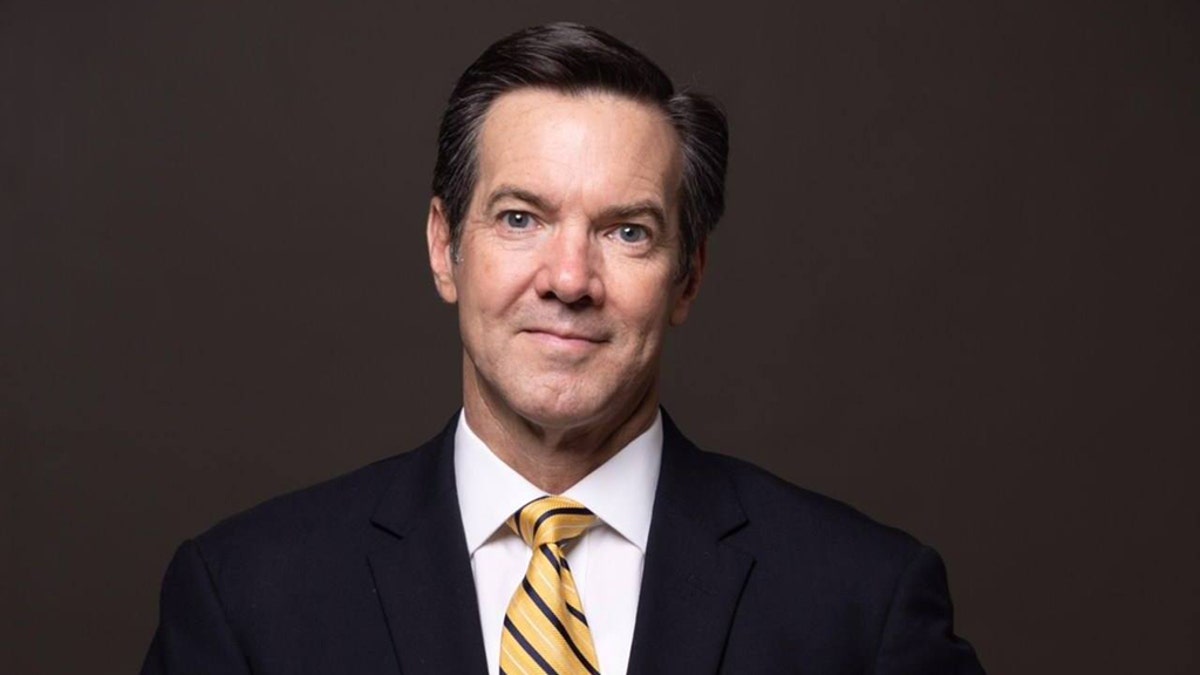
Rep. Evan Jenkins unsuccessfully ran for Senate. He was eventually appointed to temporarily fill a seat on West Virginia's Supreme Court. (Facebook)
Instead of seeking re-election, Rep. Evan Jenkins, R-W.V., ran for Senate. Jenkins, 58, lost the primary election to state Attorney Gen. Patrick Morrisey.
He later resigned from Congress after he was selected by Gov. Jim Justice to temporarily fill a seat on the scandal-ridden state Supreme Court. Some justices retired or resigned as several are facing impeachment proceedings.
Raul Labrador

Rep. Raul Labrador ran for governor in Idaho but lost the GOP primary. (Getty Images)
Rep. Raul Labrador, R-Idaho, announced in the summer of 2017 that he would finish his current term but then run for governor of Idaho in 2018 instead of re-election. He lost the GOP primary to Lt. Gov. Brad Little.
Labrador, 50, is a founding member of the House Freedom Caucus.
Martha McSally
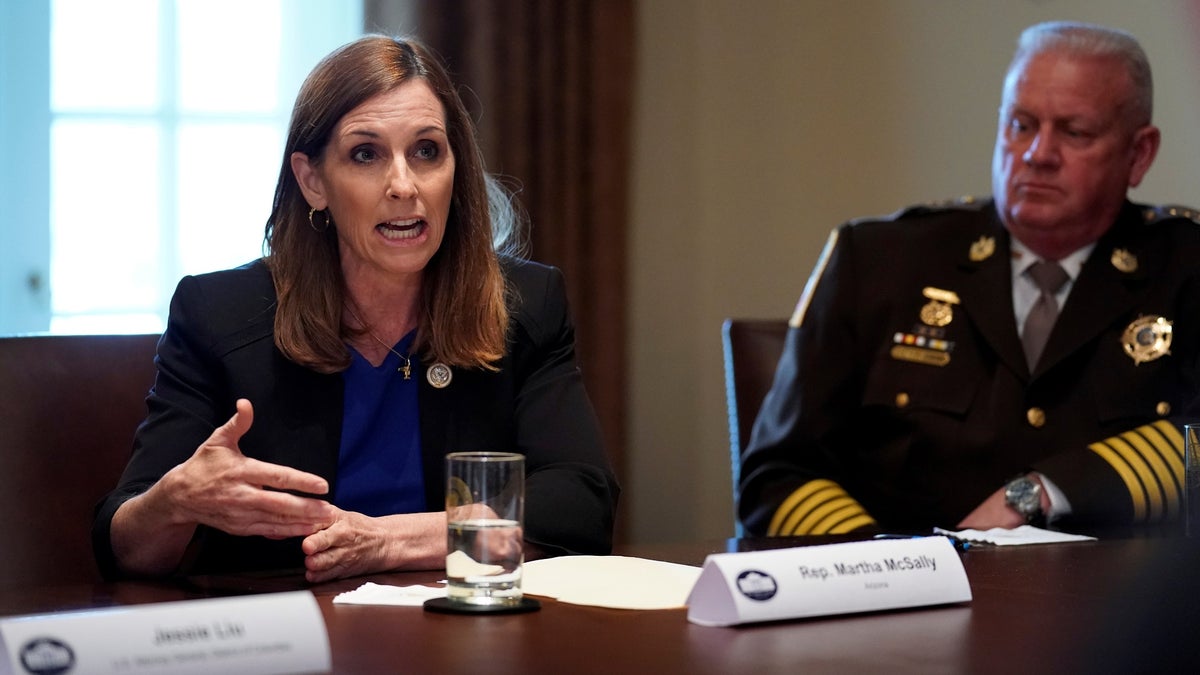
Rep. Martha McSally is running for Senate in Arizona. (Reuters/Jonathan Ernst)
Rep. Martha McSally, 52, has represented Arizona in Congress since 2015.
But for 2018, the Air Force veteran had her sights on the U.S. Senate. She lost the Senate race to Rep. Kyrsten Sinema.
Luke Messer

Instead of seeking re-election, Rep. Luke Messer unsuccessfully ran for re-election. (Michelle Pemberton/The Indianapolis Star via AP)
Rep. Luke Messer, R-Ind., sought his party's nomination for Senate instead of running for re-election. Messer, 49, lost the primary to businessman Mike Braun.
Kristi Noem

Rep. Kristi Noem is the governor-elect in South Dakota. (Reuters/Larry Downing)
Instead of seeking re-election in 2018, Rep. Kristi Noem, R-S.D., announced in November 2016 a bid for governor instead.
Noem, 46, won the election and is the governor-elect for her state.
Steve Pearce
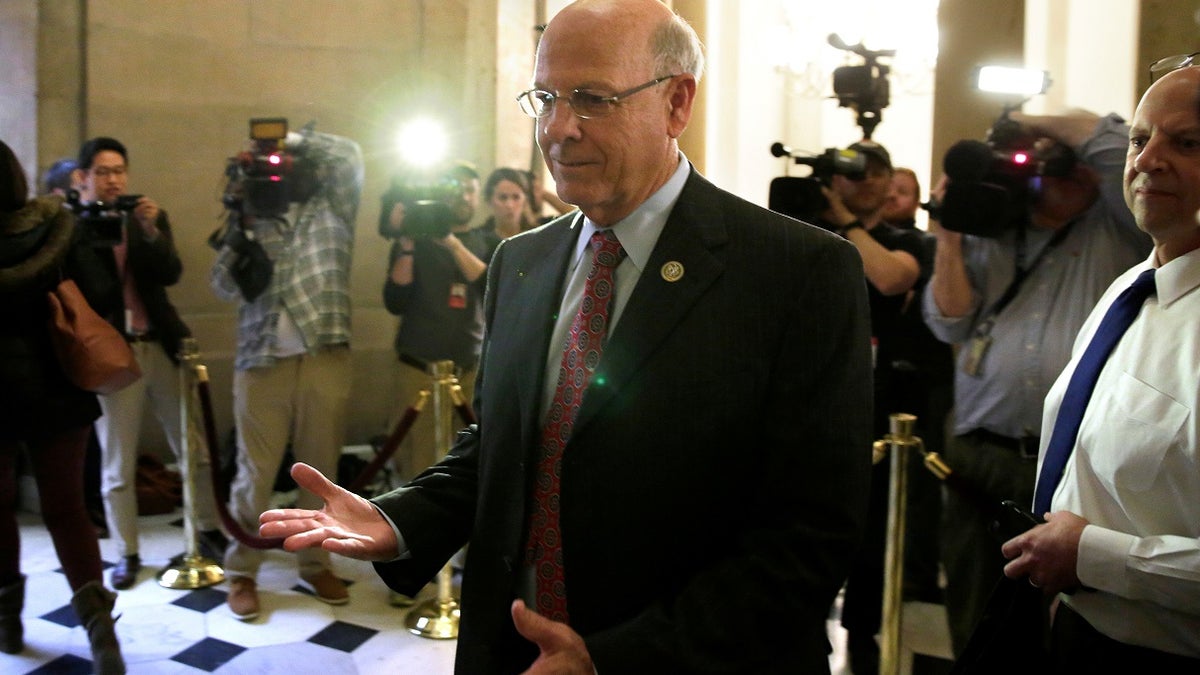
Rep. Steve Pearce ran for governor in New Mexico instead of re-election. (Reuters/Yuri Gripas)
New Mexico Rep. Steve Pearce opted to run for governor of his state instead of re-election. He ultimately lost to Democratic Rep. Michelle Lujan Grisham.
Pearce, 71, has been a congressman for more than 12 years.
Jim Renacci

Rep. Jim Renacci ran for Senate in Ohio. (Reuters/Aaron P. Bernstein)
Rep. Jim Renacci, R-Ohio, unsuccessfully ran for Senate in his state against incumbent Sherrod Brown as the GOP nominee.
Renacci, 59, has served in Congress since 2011.
Todd Rokita

Rather than running for re-election, Rep. Todd Rokita unsuccessfully ran for Senate. (AP Photo/Darron Cummings)
Rather than running for re-election, Rep. Todd Rokita instead sought the GOP nomination for Senate in his state. Rokita, 48, lost the primary to Mike Braun.
Rokita first assumed his congressional seat in 2011. State Rep. Jim Baird won the Republican primary for Rokita's seat. Baird's campaign has said it won't step aside if Rokita decides to want to keep his current seat.
Republican lawmakers who lost re-election bids
Mike Bishop
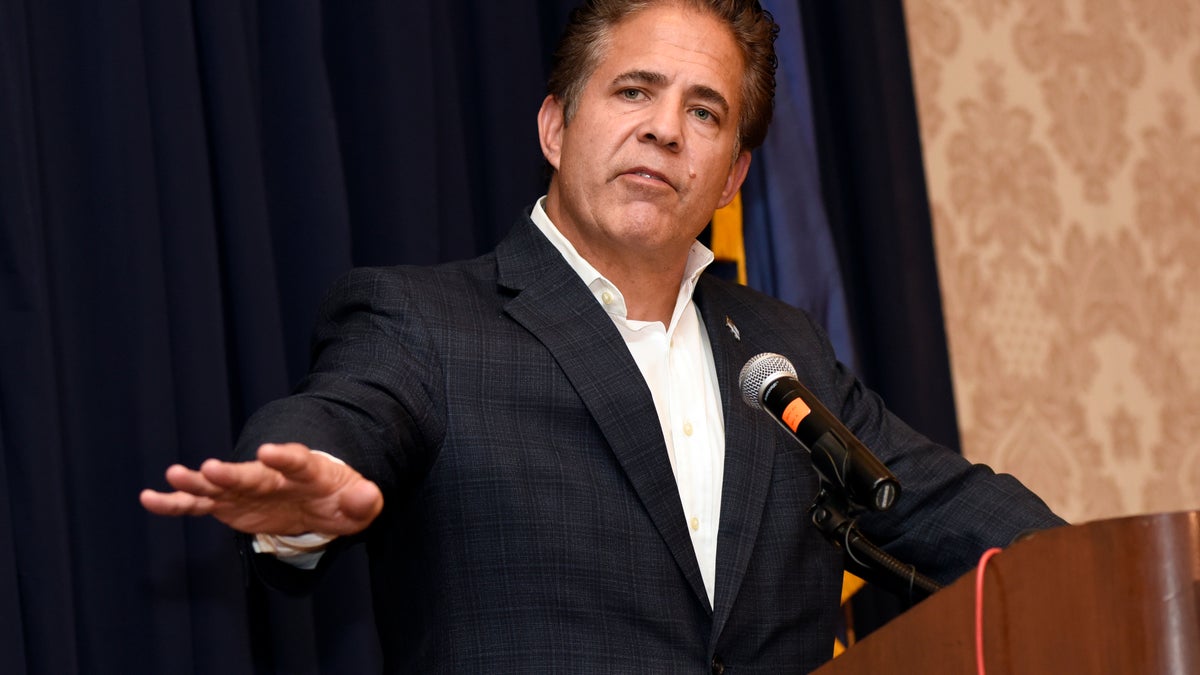
Rep. Mike Bishop, R-Mich., served in Congress since 2015. (AP Photo/Jose Juarez)
Republican Rep. Mike Bishop, an incumbent, lost Michigan's 8th congressional district to his Democratic opponent, Elissa Slotkin.
Rod Blum

Rep. Rod Blum, R-Iowa, has served in Congress since 2015. (AP Photo/Jose Luis Magana)
Two-term Republican incumbent Rep. Rod Blum of Iowa's 1st district fell to Democrat Abby Finkenauer in a hotly contested congressional race.
Dave Brat

Rep. Dave Brat, R-Va., has served in Congress since 2014. (AP Photo/Steve Helber)
Republican incumbent Rep. Dave Brat of Virginia's 7th district was knocked off by Democratic newcomer and former CIA officer Abigail Spanberger in the race for U.S. House.
Brat first won his seat after upsetting House Majority Leader Eric Cantor in the 2014 Republican primary. Republicans had held the district since 1971.
Mike Coffman
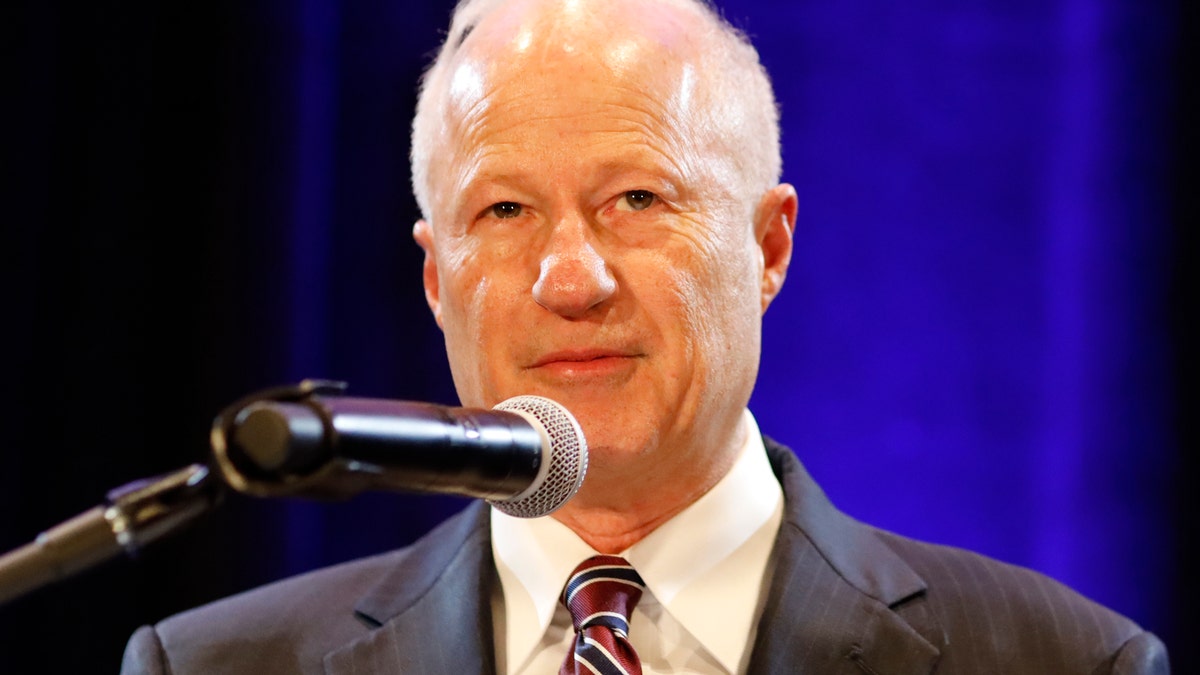
Rep. Mike Coffman, R-Colo., has served in Congress since 2009. (AP Photo/Jack Dempsey)
Five-term Republican Rep. Mike Coffman of Colorado’s 6th district had his seat flipped by first-time Democratic candidate Jason Crow, a former Army Ranger and captain who fought in Iraq.
Coffman won the district by eight points in 2016.
Barbara Comstock

Rep. Barbara Comstock has served in Congress since 2015. (Jahi Chikwendiu/The Washington Post via AP)
GOP Rep. Barbara Comstock — among the most endangered GOP incumbents, branded Barbara "Trumpstock" by Democrats — lost to Jennifer Wexton in Virginia’s 10th district.
Comstock had won her race comfortably in 2016.
John Culberson
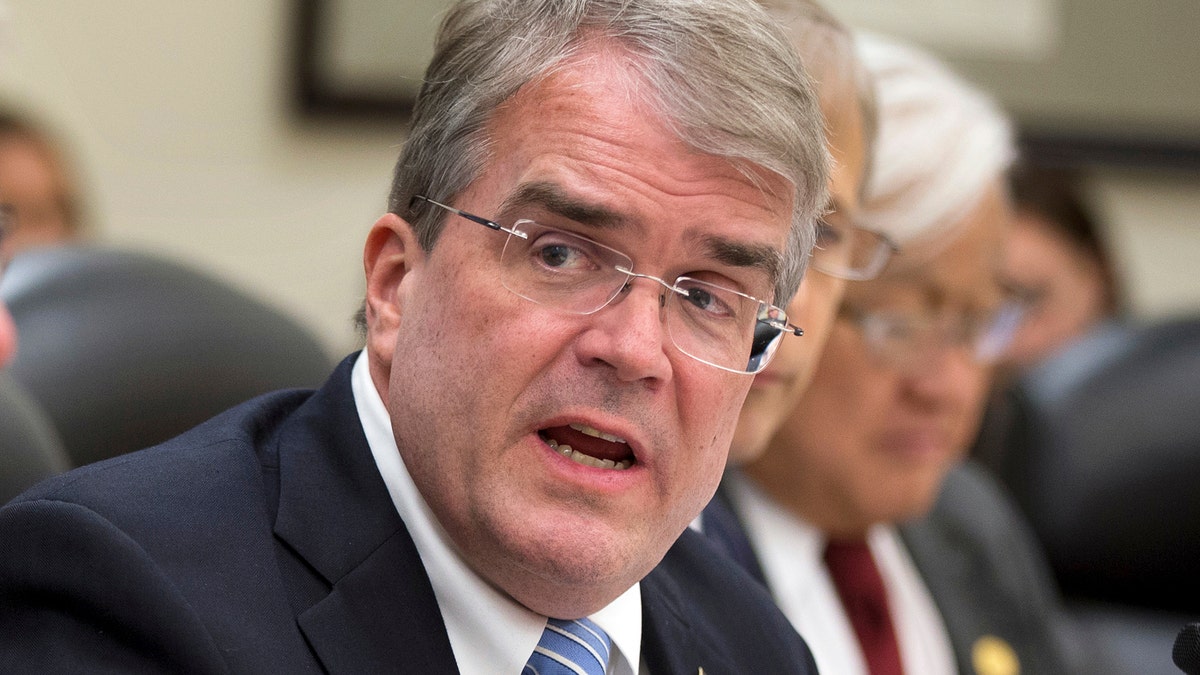
Rep. John Culberson, R-Texas, has served in Congress since 2001. (AP Photo/Manuel Balce Ceneta)
Longtime Houston GOP Rep. John Culberson lost to Democrat Lizzie Pannill Fletcher, flipping the wealthy 7th district in Texas.
Carlos Curbelo

Rep. Carlos Curbelo, R-Fla., has served in Congress since 2015. (AP Photo/Andrew Harnik)
Incumbent GOP Rep. Carlos Curbelo of Florida’s 26th congressional district was ousted by Democrat Debbie Mucarsel-Powell. Curbelo had held the seat since 2015.
Dan Donovan

Rep. Dan Donovan, R-N.Y., has served in Congress since 2015. (AP Photo/Seth Wenig)
Republican Rep. Dan Donovan of New York’s 11th District was unseated by Democrat Max Rose.
John Faso
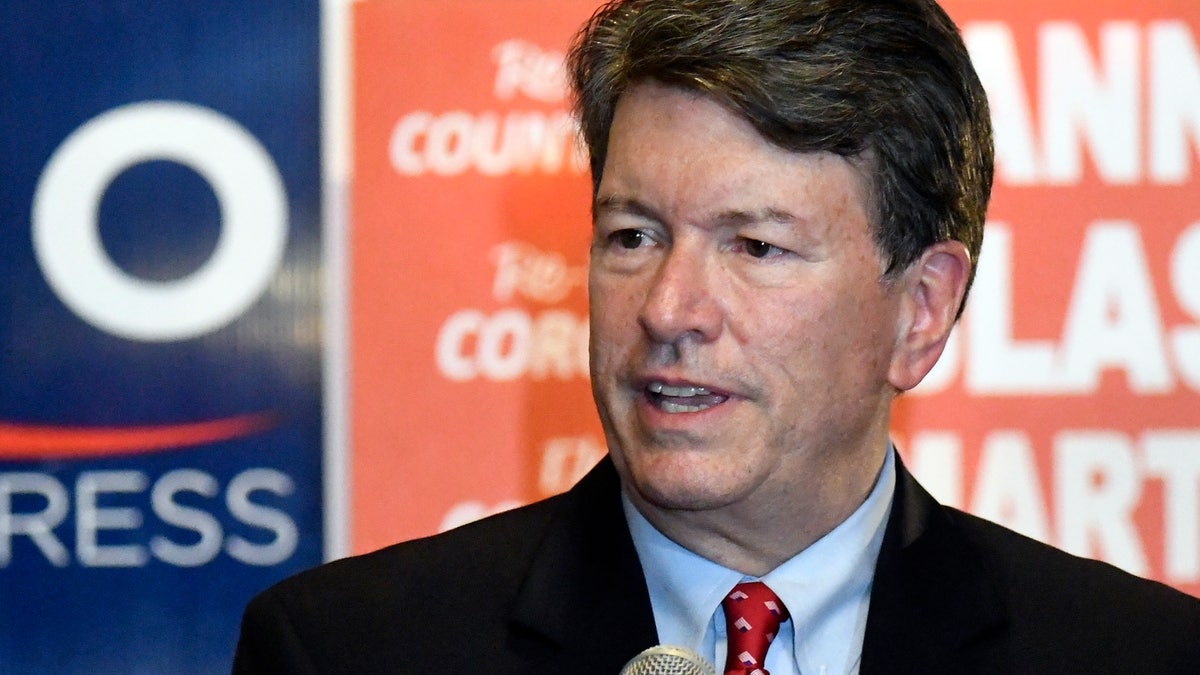
Rep. John Faso, R-N.Y., has served in Congress since 2017. (AP Photo/Hans Pennink)
New York’s 19th congressional district incumbent GOP Rep. John Faso was defeated by Democrat Antonio Delgado.
Faso had held the seat since being elected in 2016.
Dean Heller

Sen. Dean Heller, R-Nev., served in the U.S. Senate since 2011. (AP Photo/Joe Buglewicz)
Nevada Sen. Dean Heller lost his re-election bid to Democrat Jacky Rosen.
Randy Hultgren
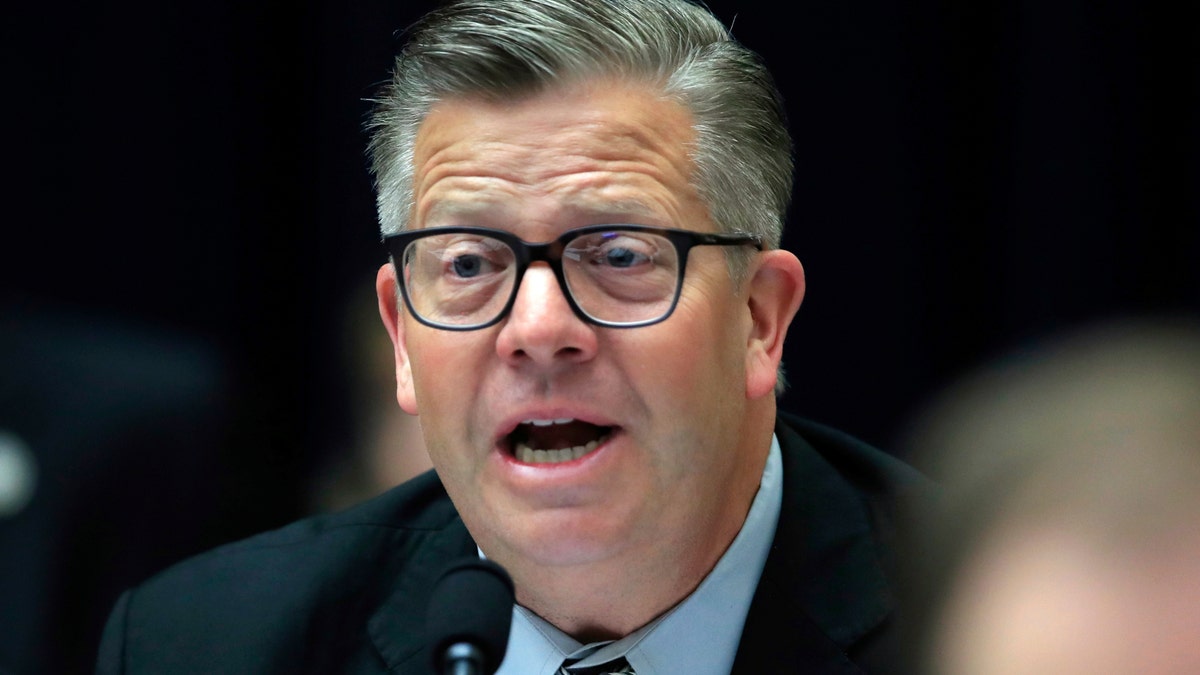
Rep. Randy Hultgren, R-Ill., has served in Congress since 2011. (AP Photo/Manuel Balce Ceneta)
Four-term Republican incumbent Rep. Randy Hultgren of Illinois’ 14th District was ousted by Democrat Lauren Underwood, the first woman and first minority to represent the congressional district.
Leonard Lance

Rep. Leonard Lance, R-N.J., has served in Congress since 2009. (AP Photo/Julio Cortez)
Republican Incumbent Leonard Lance of New Jersey’s 7th district fell to Democrat Tom Malinowski.
He had served the area since being elected in 2009.
Jason Lewis

Rep. Jason Lewis, R-Minn., has served in Congress since 2017. (Jerry Holt/Star Tribune via AP)
Incumbent GOP Rep. Jason Lewis of Minnesota’s 2nd district was defeated by Democrat Angie Craig.
Mia Love

Rep. Mia Love, R-Utah, has served in Congress since 2015. (Scott G Winterton/Deseret News, via AP)
Utah Rep. Mia Love was defeated by Democrat Ben McAdams in a race that took two weeks to settle. She was criticized by Trump, who said she would have won if she would have done more to embrace him instead of highlighting times she stood up to him.
Erik Paulsen

Rep. Erik Paulsen, R-Minn., has served in Congress since 2009. (AP Photo/Andy Clayton-King)
Republican incumbent Rep. Erik Paulsen lost Minnesota’s 3rd District to Democratic businessman Dean Phillips.
Paulsen had easily won elections throughout his five terms in office even as the Minneapolis-area district trended toward Democrats.
Bruce Poliquin
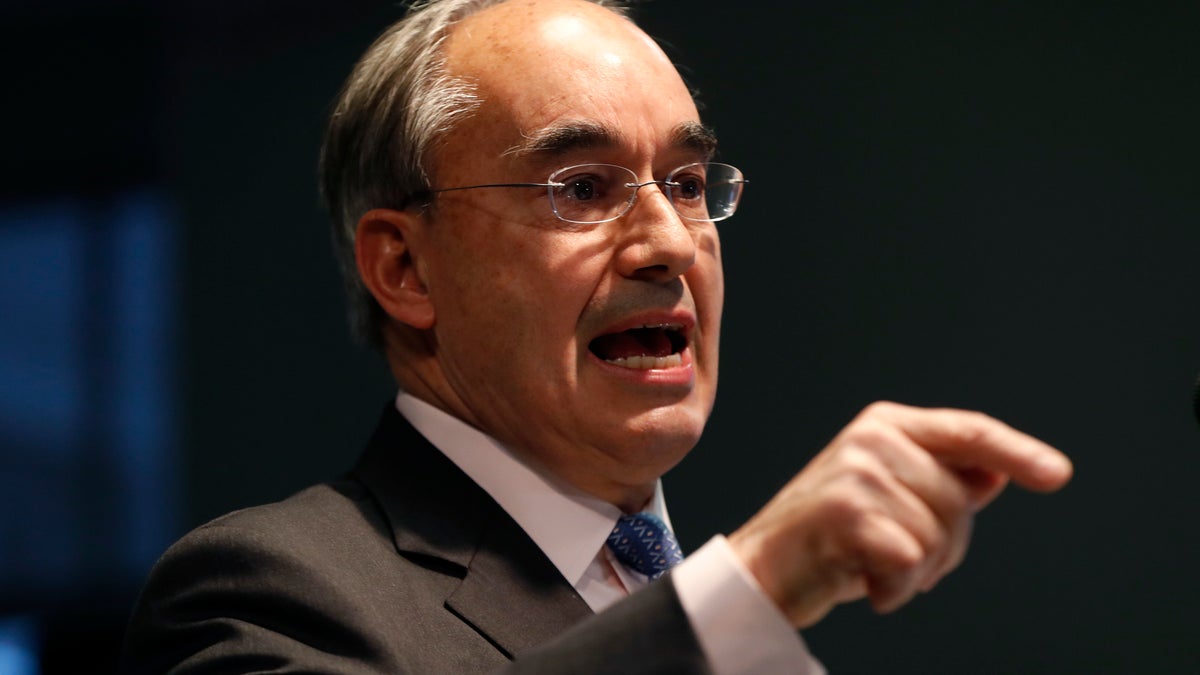
Rep. Bruce Poliquin, R-Maine, has served in Congress since 2015. (AP Photo/Robert F. Bukaty)
Two-term incumbent Rep. Bruce Poliquin lost his congressional seat after votes were tabulated in Maine's controversial ranked-choice voting system. Although he had the most votes after the first round of voting, he did not have the majority.
After the second round of voting, Democrat Jared Golden won by fewer than 3,000 votes, according to election officials.
Dana Rohrabacher

Rep. Dana Rohrabacher, R-Calif., has served in Congress since 1989. (AP Photo/Damian Dovarganes)
Longtime Rep. Dana Rohrabacher was defeated by real estate executive Harley Rouda.
Rohrabacher's ouster from his seat in Orange County has historical and symbolic significance. The county southeast of Los Angeles was home to President Richard Nixon and long considered a foundational block in the modern conservative movement. Reagan himself likened it to a Republican heaven.
Peter Roskam
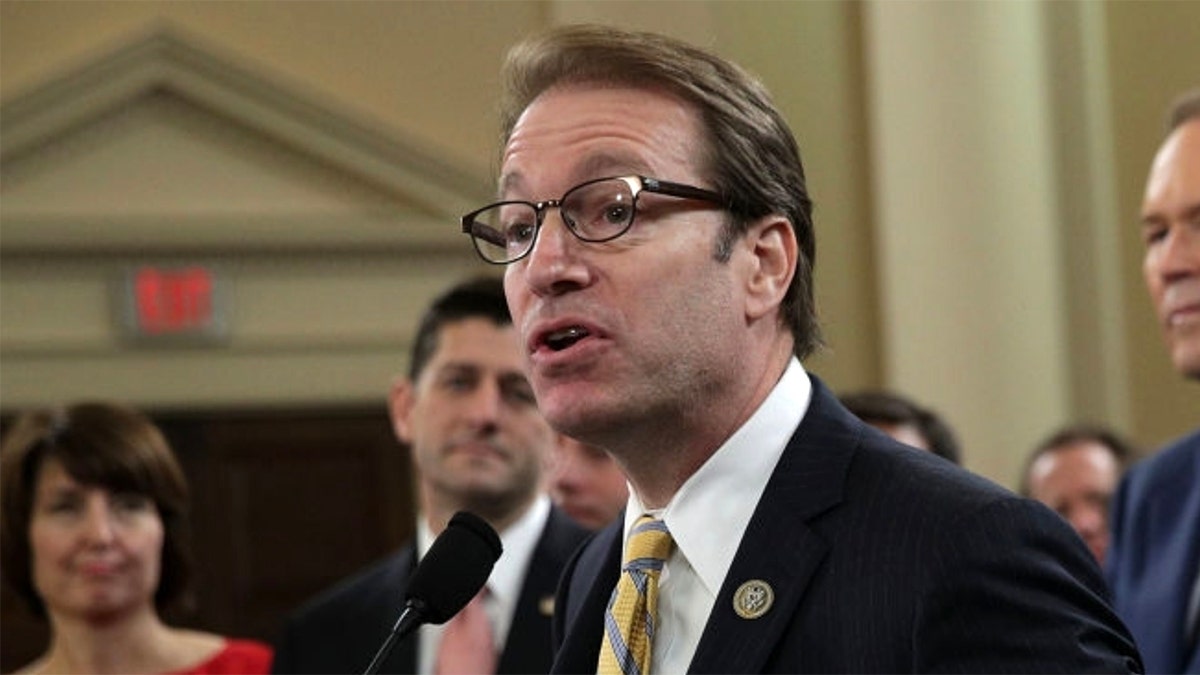
Rep. Peter Roskam, R-Ill., has served in Congress since 2007. (Getty Images)
Democratic challenger Sean Casten unseated six-term GOP Rep. Peter Roskam of Illinois' 6th district.
Republicans had previously held the suburban Chicago district for more than four decades.
Keith Rothfus

Rep Keith Rothfus, R-Pa., has served in Congress since 2013. (AP Photo/Gene J. Puskar)
Republican incumbent Rep. Keith Rothfus was unseated by Democratic Rep. Conor Lamb in Pennsylvania’s 17th district.
Steve Russell

Rep. Steve Russell, R-Okla., has served in Congress since 2015. (AP Photo/Sue Ogrocki)
Rep. Steve Russell, R-Okla., lost his re-election bid to Democrat Kendra Horn to represent Oklahoma's 5th congressional district.
Pete Sessions

Rep Pete Sessions, R-Texas, represented two districts while in Congress. He has served since 1997. (AP Photo/Jeffrey McWhorter)
Republican incumbent Rep. Pete Sessions was defeated by Democrat Colin Allred in Texas’ 32nd district.
Scott Taylor
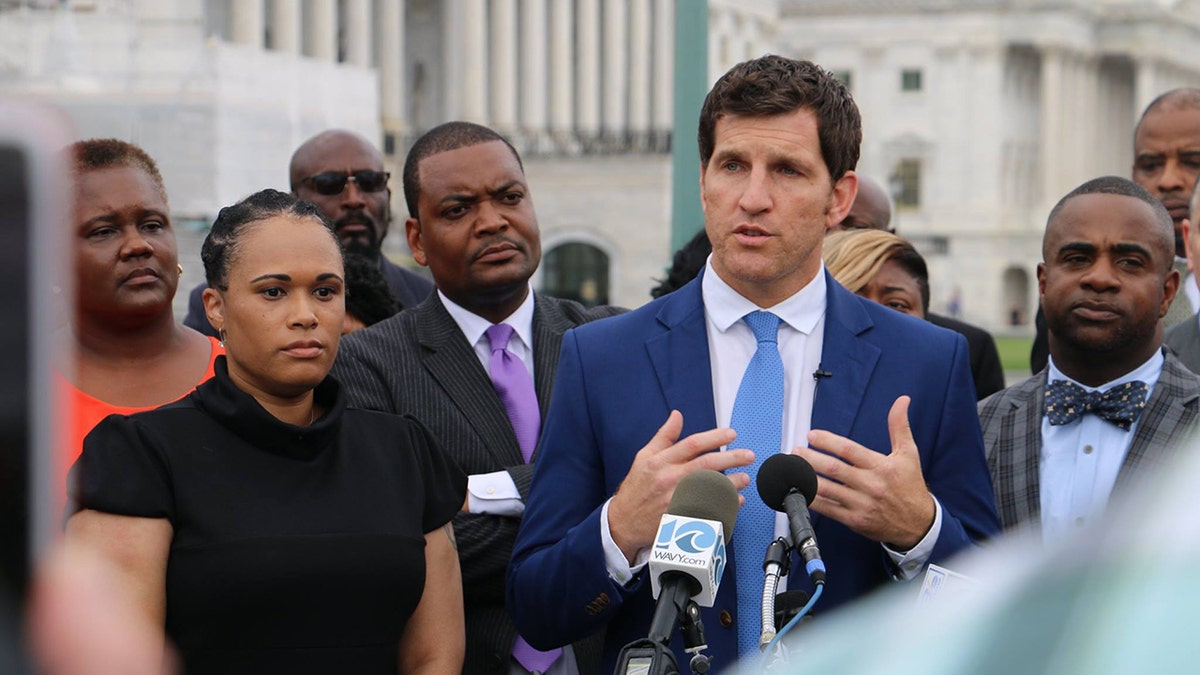
Rep. Scott Taylor, R-Va., has served in Congress since 2017. (Facebook)
Democrat Elaine Luria ousted her Republican opponent and incumbent Rep. Scott Taylor in the race to represent Virginia's 2nd congressional district.
Mimi Walters

Rep. Mimi Walters, R-Calif., has served in Congress since 2015. (AP Photo/Chris Carlson)
California Rep. Mimi Walters was defeated by political newcomer Katie Porter, a stunning defeat in the heart of Orange County, once a nationally known Republican stronghold.
Kevin Yoder

Rep. Kevin Yoder, R-Kan., has served in Congress since 2011. (AP Photo/Charlie Riedel)
Political newcomer Sharice Davids unseated incumbent GOP Rep. Kevin Yoder of Kansas' 3rd district, the first LGBT Native American elected to Congress.
David Young

Rep. David Young, R-Iowa, has served in Congress since 2015. (AP Photo/Charlie Neibergall)
Incumbent GOP Rep. David Young lost Iowa’s 3rd district seat to Democrat Cindy Axne.
Fox News' Alex Pappas, Stephen Sorace and The Associated Press contributed to this report.




